We are thrilled that our review (written jointly with lab alumni Jeong-Mo Choi and Alex Holehouse) made the list of highly downloaded articles for 2020 across 15 review journals published by Annual Reviews in the Physical Sciences. https://www.annualreviews.org/page/top-physical-2020
Matthew King, peerless postdoc in the Pappu lab, will be one of the two recipients of the the Postdoctoral Award of the IDP Subgroup of the Biophysical Society. He will give an invited talk at the 15th annual symposium of the Intrinsically Disordered Proteins Subgroup scheduled for February 2021. Congratulations Matt!!! This continues in the tradition of previous postdocs peerless postdoc in the Pappu lab learned that he will be one of the two recipients of the Postdoctoral Award given by the Intrinsically Disordered Proteins Subgroup of Biophysical Society. In February 2021, Matt will give an invited talk as part of the 15th annual symposium of the IDP subgroup. He will also receive an honorarium in recognition of his selection as an awardee. Congratulations Matt!!! He continues in the tradition of previous postdocs Rahul K. Das and Jeong-Mo Choi who made a significant impact on the IDP field. We wish you well Matt and we look forward to a riveting talk at the meeting.
Andreas Vitalis has released version 4.0 of CAMPARI. This version and updated documentation are accessible via the sourceforge site - http://campari.sourceforge.net. New features are detailed here: http://campari.sourceforge.net/V4/index.html. Among the important advances are the ability to calculate transfer free energies using compartmentalization potentials, and the use of CAMPARI and ABSINTH (including revisions to ABSINTH parameters along with a new correction) in virtual screening, J. Chem. Inf. Model. 60 (10), 5188-5202 (2020). The README, which has all bug fixes. Comments on other changes, is here: https://sourceforge.net/projects/campari/files/. We are actively working on blending the advancements being pursued in the WashU-St.Louis versions with the UZ-Zurich versions. Stay tuned for more announcements.
12/31: We come to the end of annus miserables. We made it through hard work, faith in one another, and a commitment to the adage of one for all, all for one. Indeed, it takes a village to be creative. To one and all, HUGE thanks and looking forward to a better 2021. It has to be better.
12/22: Our last lab meeting of the year, which was Min's first ever presentation as well. We will be thinner given the departures of December, but ready and raring to go come January.
12/16: Today Megan became Dr. Megan Claire Cohan, Ph.D. Congratulations Megan for your stirring presentation and a thesis that seeds important directions for the lab. Thanks to Kiersten, we have a capture of the final moments of Megan's defense.
We will miss you Megan, but we know we send you off to take on the world of management consulting with the acumen and scholarship that will wow your new colleagues. Be well, go well, do well, and live well Megan!
12/07: Today, Max bid us goodbye. Max, Ashley, and precious little Ava Jean are off to Berkeley. There, their academic careers will start afresh as PIs. We will miss you Max. With Max's departure we will lose our savant to whom we turned every time we needed to learn about biology. We wish you and Ashely all the very best that life has to offer. Be well, go well, do well, and live well Max!
We hunkered down, trying to keep up with everything that was going on around us. We got through and are collectively in one piece.
We welcomed Min Kyung Shinn and Louis Smith as new postdocs to the Pappu lab. Min and Louis came aboard on September 01, 2020. Min comes to us from across the park. She did her PhD in the Lohman lab and she will pick up the mantle of working on the regulation of cell division by IDRs in bacteria and will work closely with the Levin lab, as the first CSELS postdoctoral scholar, to push on new areas pertaining to biomolecular condensates and phase transitions within bacteria. Welcome aboard Min.
Louis comes to us from the University of Rochester where he worked with Dave Mathews on the development of new methods for simulations of RNA molecules. Louis will bring his expertise to bear on the problem of phase transitions in RNA viruses, and the development of multiscale models for protein-RNA phase behavior. We expect that he will work closely with colleagues in CSELS including Mike Vahey and with our good friends and collaborators, Amy Gladfelter and Simon Alberti.
Rohit’s last talk in his three-part series on the Molecular Grammar of biomolecular condensates is now available from https://condensates.com. Please visit: https://condensates.com/resources/rohit-pappu-on-molecular-grammar-of-condensates-part-3/
Rohit gave three lectures as part of the Kitchen Table Talk series hosted by https://condensates.com and sponsored by Dewpoint X. These talks highlighted emerging concepts in and the lab’s contributions to understanding the Molecular grammar of biomolecular condensate formation and regulation. Transcripts and video recordings of the three lectures, the first one on July 29th, the second on August 5th, and the third on August 12th are available via condensates.com. Registration is required to access the videos, but registration is free. Please visit https://condensates.com/resources/rohit-pappu-on-molecular-grammar-of-condensates-part-1/ for lecture 1 and https://condensates.com/resources/rohit-pappu-on-molecular-grammar-of-condensates-part-2/ for lecture 2.
Lab alum Jeong-Mo Choi received and accepted an offer from Pusan National University (PNU). He will be joining the Department of Chemistry at PNU as a tenure-track assistant professor. The start date is September 1st. We are so happy for Jeong-Mo and wish him all the success imaginable in the new Choi lab.
Furqan and Rohit wrote an insight article published in eLife summarizing interesting results from Ranganathan and Shakhnovich who describe how dynamics can arrest the growth of condensates by creating sticky traps.
Xiangze’s important paper showing how the important Gaussian Cluster Theory of Raos and Allegra can be adapted and deployed in conjunction with single-chain simulations of coil-to-globule transitions to compute sequence-specific phase diagrams has been accepted for publication in Biophysical Journal. This is excellent news and congratulations Xiangze.
Kiersten, Rohit and the stickers-and-spacers model were featured in a Nature Methods piece on studying biomolecular condensates written by Vivien Marx. Also featured were our colleagues, Cliff Brangwynne, Amy Gladfelter, Tony Hyman, Edward Lemke, and others. Thank you Vivien for a wonderful article.
Megan learned that she will be one of the two recipients of the Ceil M. DeGutis Prize in Chemical Biology or Medicinal Chemistry for 2020. This award was established in memory of the late Ceil M. DeGutis, in recognition of a graduate student’s significant contribution to the fields of Chemical Biology or Medicinal Chemistry, broadly defined. Megan receives this award based on her research dedicated to understanding how intrinsically disordered regions (IDRs) might impact the molecular functions of bacterial proteins. The award includes a $250 cash prize and plaque. Congratulations Megan!!!!
Anna Eddelbuettel graduated from WashU with her Bachelor’s degree in BME and a minor in teaching. As a parting gift, she learned that she was one of seven graduating seniors to receive the BME department’s Outstanding Senior Award for Academic Excellence. In addition, Anna received the Outstanding Senior Achievement Award. Congratulations Anna!!! We wish you the very best of all that lies ahead including a productive and sterling career as a PhD student in the CBE department at Princeton.
Megan and Rohit wrote an article, accepted for publication in Trends in Biochemical Sciences. The article is entitled Making a case for disordered proteins and biomolecular condensates in bacteria. Stay tuned for seeing the soon to be published version.
Ammon worked with the Rudra lab at WashU (https://rudralab.wustl.edu/) to characterize unique supramolecular structures formed by chiral peptides. This work was accepted for publication in the Journal of the American Chemical Society. Ammon’s contributions to the characterization of these helical fibers led to some innovative geometric descriptions. Well done Ammon!!!
Megan gave an invited talk on April 23rd as part of the virtual symposium hosted by IDPSIG (https://idpsig.weebly.com/). This symposium was attended by well over 300 participants around the world. Megan presented her story on the molecular dissection of Bs. FtsZ. Well done Megan!!!
We are into Day 30 of our working from home routine. We are getting good at this stuff, although a return to the white board, the lab Nespresso machine, thinking and working together in 3D, and doing experiments is what we yearn. Go away SARS-CoV2, we wish to get back to working the way we once knew.
Today, 04/16/2020 was a good day!!! Cell just published three back-to-back-to-back papers on how G3BP1/2 and its network of protein-protein and protein-RNA interactions contribute to stress granule assembly and regulation. Of the three, one is from the Brangwynne lab (https://www.cell.com/cell/fulltext/S0092-8674(20)30339-1), one from the Taylor lab (https://www.cell.com/cell/fulltext/S0092-8674(20)30339-1), and one from the Alberti lab that involved us in close collaboration (https://www.cell.com/cell/fulltext/S0092-8674(20)30342-1). Congratulations Titus Franzmann, Jordina Guillén-Boixet and of course, the irreplaceable Alex Holehouse. Looking forward to feedback from the community on this work with the Alberti lab.
Anna Eddelbuettel learned that she received an NSF fellowship from their GRFP to support the first three years of her PhD studies. Congratulations Anna!!! This is an incredible streak of success. Well deserved!!! And a huge thank you to Megan Cohan for the incredible amount of work she put in to help Anna with the proposal.
Anna Eddelbuettel, our own BME senior has chosen to pursue her PhD work in the CBE department at Princeton. Congratulations and good luck Anna!!!
We are all working from home with a couple of exceptions. Now more than ever, scientists are essential. Whilst staying at home, let’s think of ways we can help.
Megan’s work, the first from the lab, uncovering the contributions of different modules of B. subtilis FtsZ to its assembly and activity was published online in J. Mol. Biol. More to come from the peerless Megan.
Megan’s paper dissecting the functional contributions of the C-terminal disordered tail of FtsZ was accepted for publication in J. Mol. Biol. Congratulations Megan and more to come!!!!
The lab had a strong showing at the 64th annual meeting of the biophysical society, which was held in sunny San Diego. In addition to enjoying the good weather and relief from frigid St. Louis, Ammon, Furqan, Jared, Kiersten, Martin, and Xiangze enjoyed the camaraderie of traveling as a group and learning about new developments in Biophysics. We got to catch up with lab alumni including Jeong-Mo and also met up with new recruits in Louis Smith. All those who attended presented posters and we are delighted by the positive feedback and the plans that are taking shape. And it was good fun to catch up with colleagues and dear friends.
Furqan won one of the two student research achievement awards (SRAA) given out by the Biopolymers In Vivo (BIV) subgroup of the Biophysical Society for his poster on phase diagrams of multicomponent systems, which he presented at the 64th annual meeting of the BPS. Well done Furqan and congratulations!!!
Rohit gave a talk on Charge regulation of conformational and phase behavior of IDPs at the postdoc organized symposium hosted by the IDP special interest group (IDPSIG) at Stanford University. Huge thanks to Steven Boeynaems, Keren Lasker, Heather Meyer, and Broder Schmidt for the wonderful invitation and stimulating conversations. It was good to catch up with old friends Tanja Mittag and Allan Drummond and bear witness to Lucia Strader’s brilliant presentation. Thank you IDPSIG - keep up the great work!!!
The lab’s work, in collaboration with the Mittag lab, on the Valence and patterning of aromatic residues determine the phase behavior of prion-like domains was published on February 07 in Science. Brandie Jefferson wrote a nice story about our work (https://source.wustl.edu/2020/02/collaboration-lets-researchers-read-proteins-for-new-properties/).
Rohit gave a student invited talk as part of the Physical Chemistry seminar series at the University of Washington. Thanks to Chantelle Leveille and fellow students for the kind invitation and wonderful hospitality. It was a tremendous experience and great fun getting to know new colleagues at UW - seeing the other Washington University - and spending quality with good friend and kindred spirit Sarah Keller to learn about what membranes have been up to lately.
Tyler Harmon, a key Pappu lab alumnus, contributed as a co-author to an important paper on the role of phase separation in reducing transcriptional noise in cells. A beautifully simple piece of work driven by Christoph Zechner in collaboration with Frank Jülicher and Tony Hyman (https://science.sciencemag.org/content/367/6476/464.full). Well done Tyler!!!
Anna learned that she has been admitted to the PhD program in Chemical and Biochemical Engineering at Princeton University. We are confident that other offers of admission are in the offing, giving her several opportunities to choose from in the near future. Well done Anna and Congratulations!!!
Rohit has been inducted, by election, as a full member of the Sigma Xi Scientific Research Honor Society.
Amy Gladfelter and her PhD student Ian Seim visited the lab and spent the day with us on Monday, January 13th. We had an exhilarating day of conversations about Whi3, condensates as thermo sensors, and the details of protein-RNA phase behavior. Looking forward to more interactions with the Gladfelter lab. Amy also gave an inspiring talk as part of the Biophysical Evening series. The students loved this talk!!!
Alex received a dollop of good news as he got his independent career off the starting blocks. Three papers that was involved in, two of which he drove, and one of which he essentially spearheaded, were accepted in Molecular Cell, Cell, and Science. This was a good way to get off the mark - to use that most cricketing of expressions!!! Lots more to come from Alex on his own now, and those that follow in his footsteps in the Pappu lab.
To all of our colleagues and friends, Happy New Year from the Pappu lab. We are pleased to announce that as of today, January 01, 2020, Alex Holehouse is an alumnus of the Pappu lab. Today is the first day of his new journey as an independent PI, chief of the Holehouse lab (https://www.holehouselab.com), and tenure-track Assistant Professor in the Department of Biochemistry and Molecular Biophysics, which is part of the Washington University School of Medicine. Alex will also be a member of CSELS - the Center for Science & Engineering of Living Systems. Congratulations Alex and Good Luck!!!!
Rohit delivered the closing keynote lecture at the EMBO Workshop on Intrinsically Disordered Proteins that was held at the IISc campus in Bangalore. The title of his lecture was Functional regulation by and charge regulation of Intrinsically Disordered Proteins.
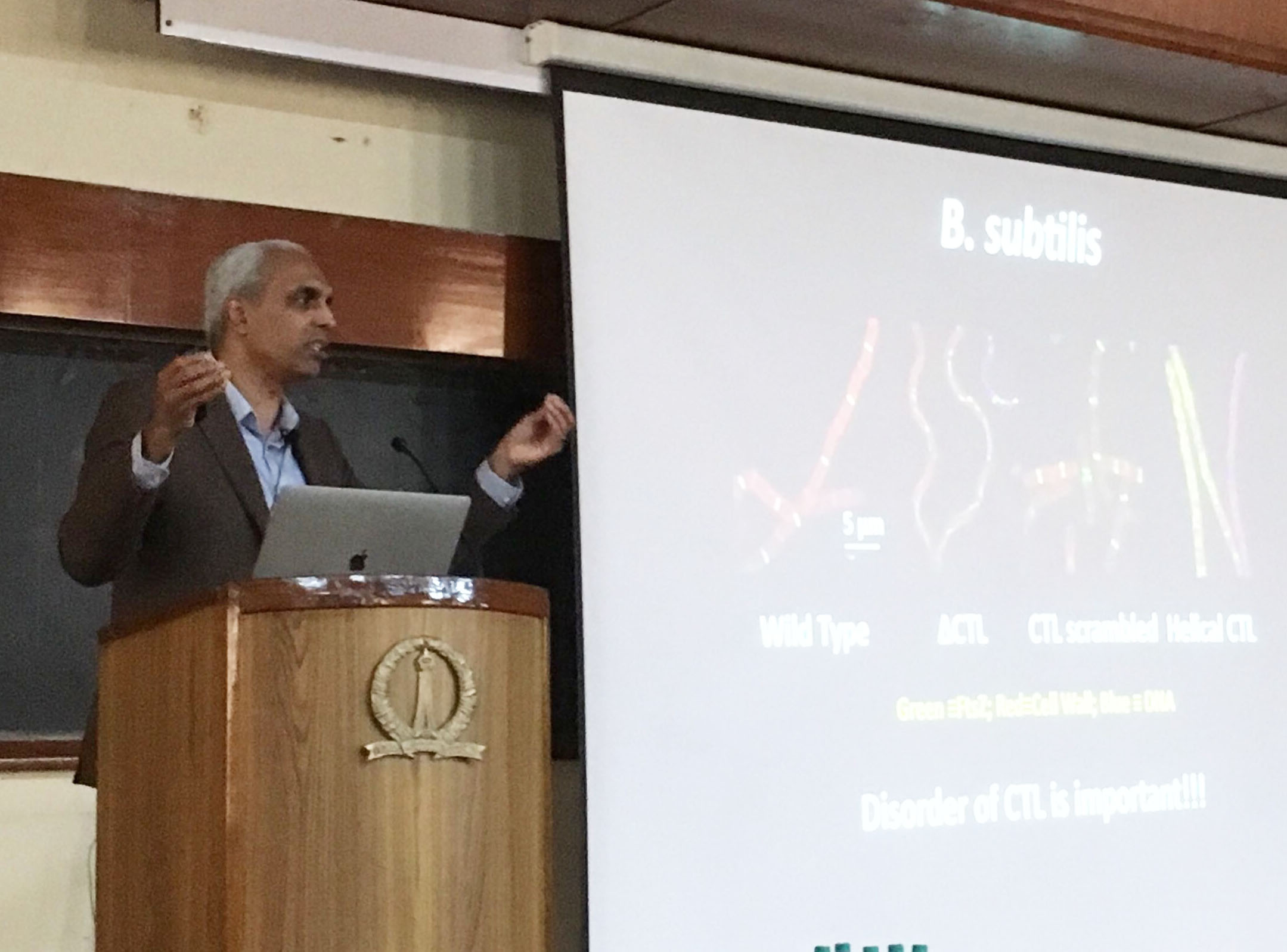
Martin won the prize for best poster by a postdoc / PI at the EMBO workshop on Intrinsically Disordered Proteins held on the IISc campus in Bangalore, India. He presented his work on uncovering the impact of charge regulation as a determinant of protein disorder vs. order.
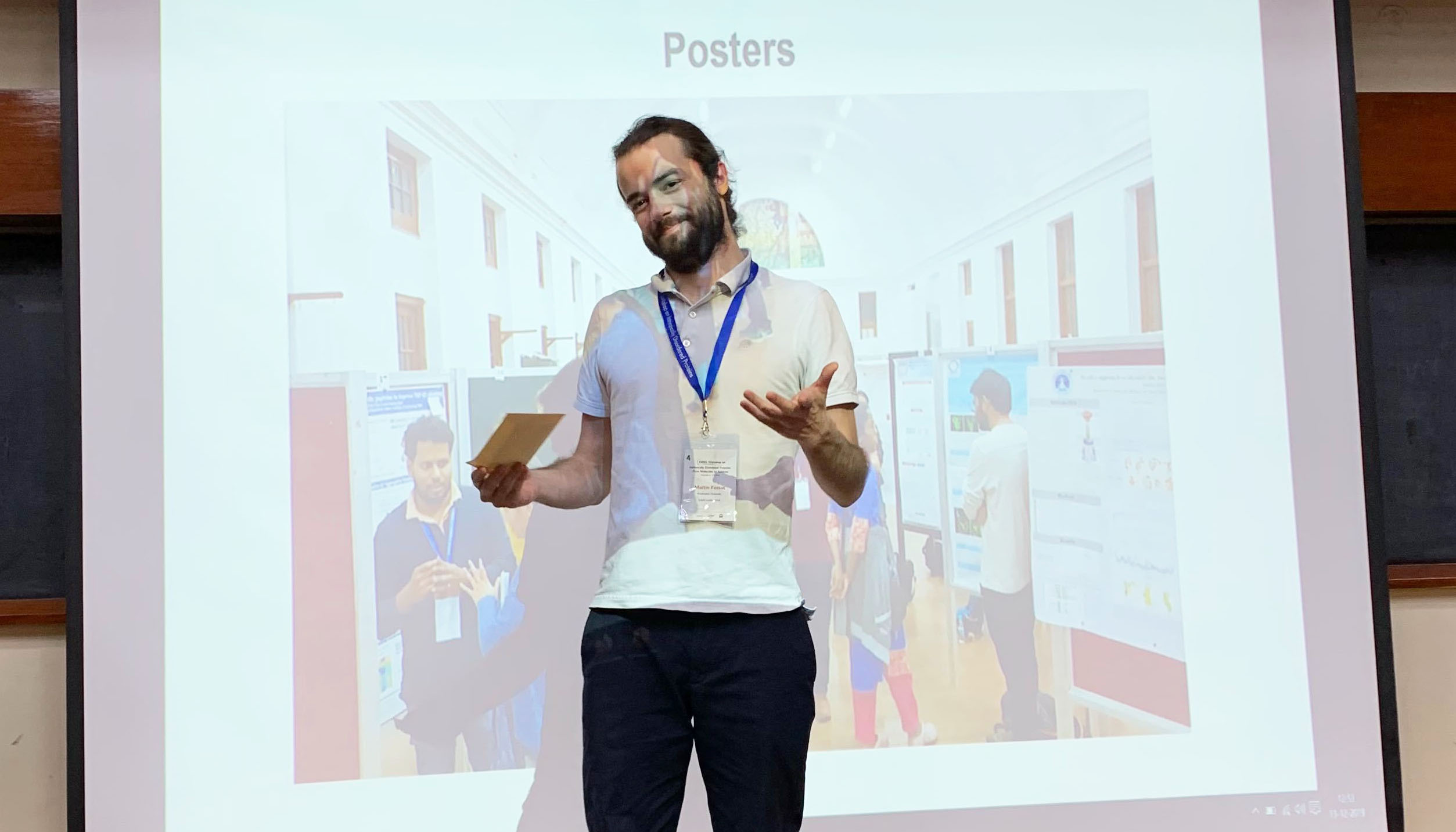
Alex gave a selected short talk at the EMBO workshop on Intrinsically Disordered Proteins held at IISc in Bangalore, India. His talk was entitled Valence and patterning of aromatic residues determine the phase behavior of disorderd prion-like domains.
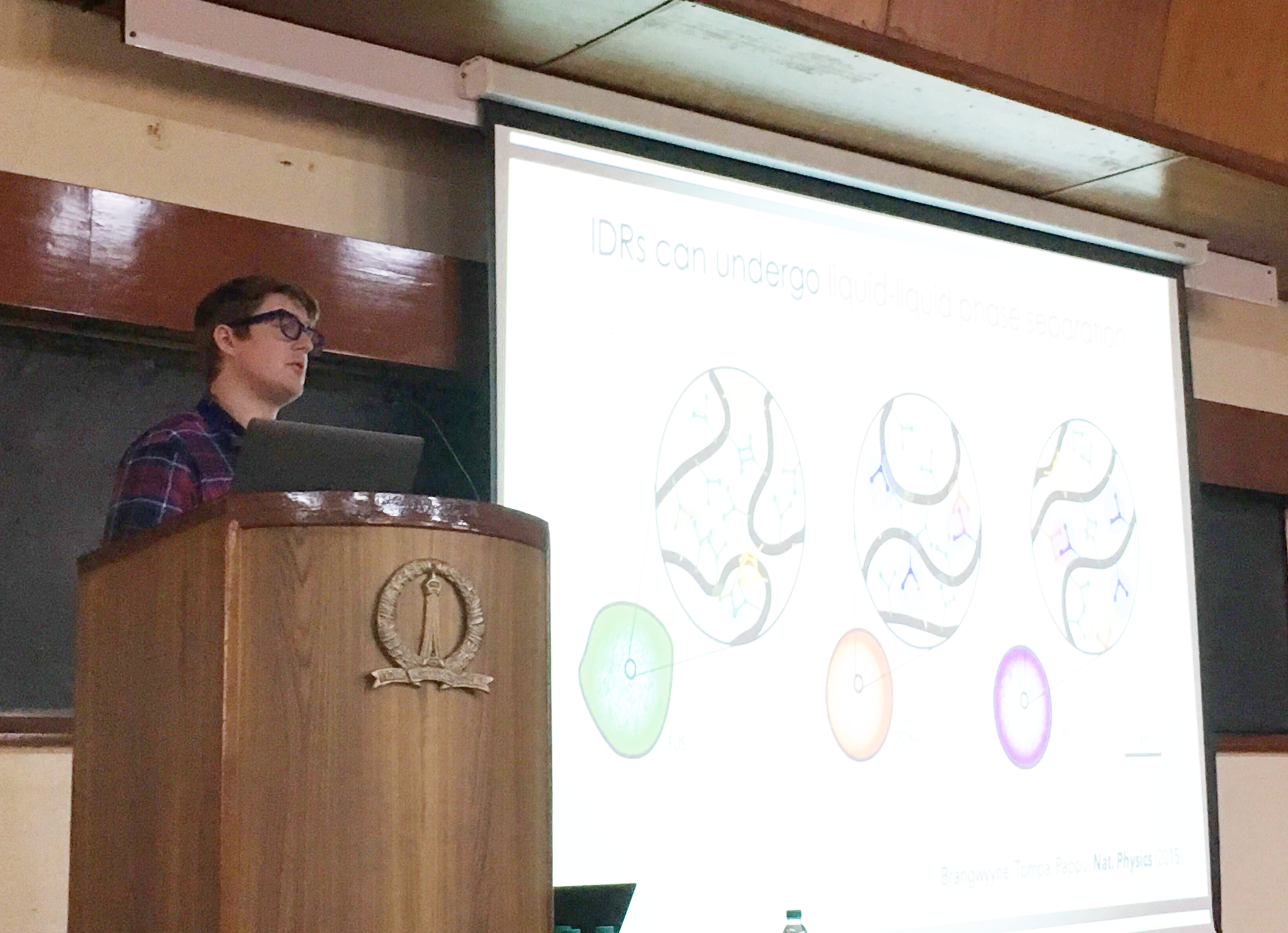
Kiersten gave a selected short talk at the EMBO workshop on Intrinsically Disordered Proteins held at IISc in Bangalore, India. Her talk was entitled Modeling the effects of ligand binding on the phase behavior of aggregation-prone proteins.
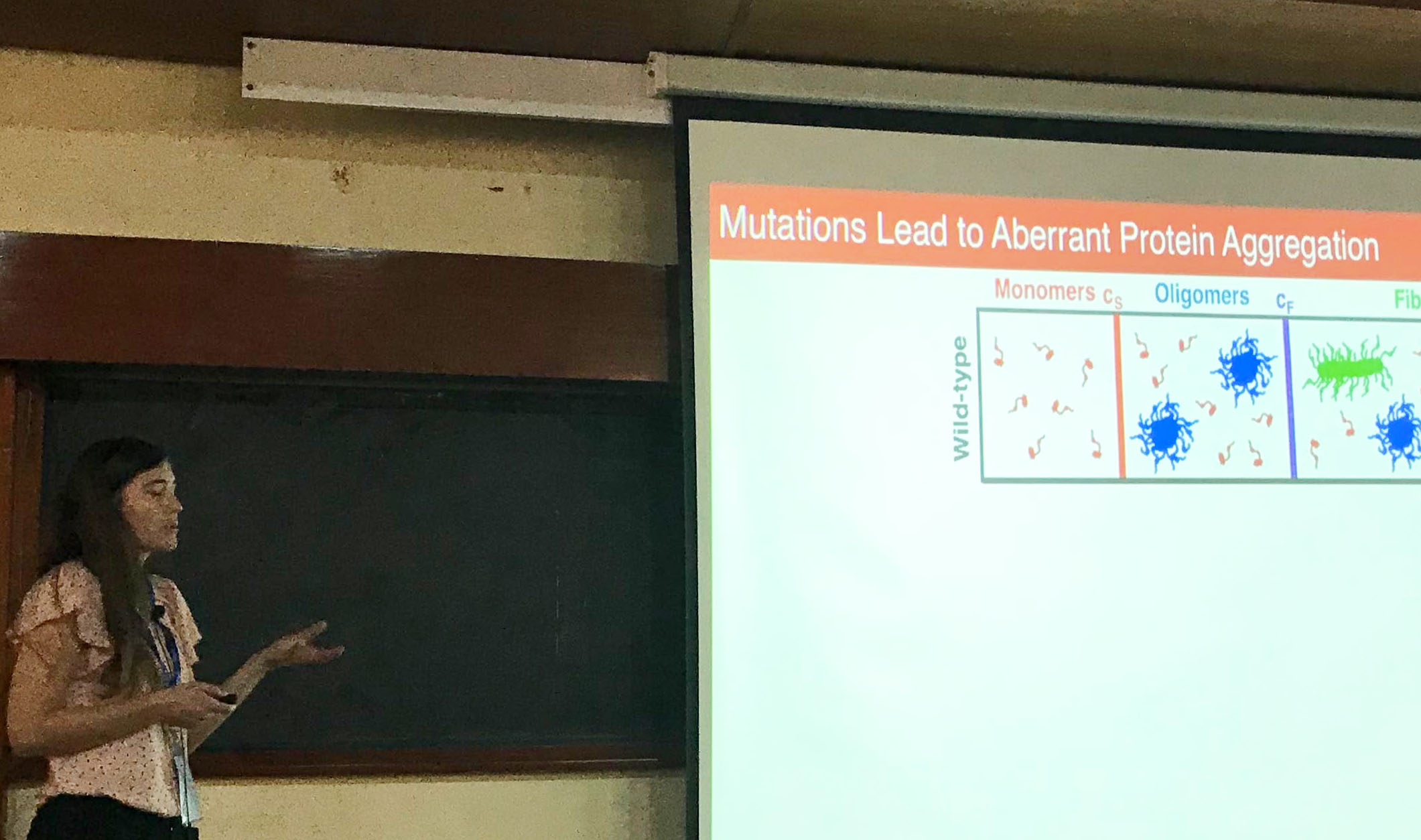
Rohit was listed among the most cited researchers for 2019 by the Institute for Scientific Information. The McKelvey School of Engineering wrote about this in a recent news article. https://engineering.wustl.edu/news/Pages/Martin-Pappu-Yang-among-most-highly-cited-researchers-worldwide.aspx
Alex, Kiersten, Martin, and Rohit are in Bangalore, India to attend and present at the EMBO workshop on Intrinsically Disordered Proteins. Alex and Kiersten are slated to give short talks on Wed, Dec 11. Martin will present his poster on Thu, Dec 12, and Rohit will present the closing keynote lecture on Fri, Dec 13th. For now, they are learning a lot, enjoying the IISc campus, and visiting Rohit’s old digs including the place where he grew up.
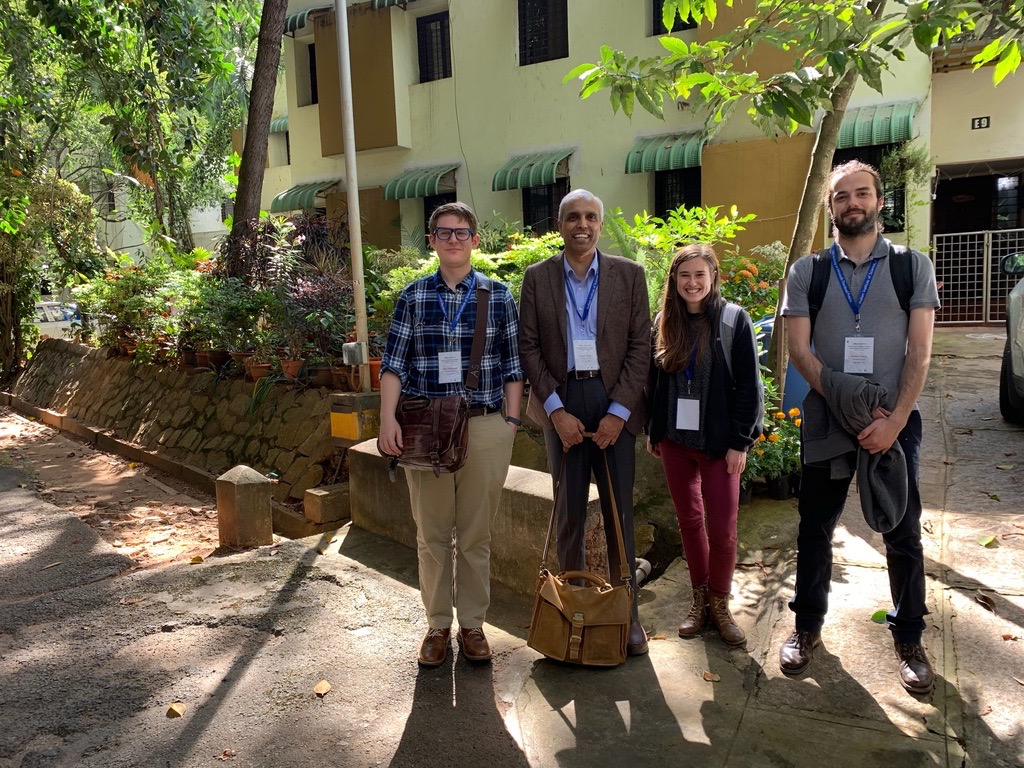
Megan learned that she will receive a travel grant to attend and present at the 3rd Bacterial Cell Biology Conference that is to be held in the Bahamas from February 26 -29, 2020. https://www.fusion-conferences.com/conference/100. Congratulations Megan!!!
Rohit presented an ACS Webinar sponsored by the Biochemistry journal on the topic of Phase separation by multivalent proteins. The presentation was, in general, very well received. A huge thank you to Alanna Schepartz Editor-in-Chief of Biochemistry for the invitation and to Sarah Smaga for hosting the webinar. And thanks to the audience from around the world for the constructive feedback.
LASSI our software package for simulations of coarse-grained models of multivalent protein and RNA molecules instantiated using the stickers-and-spacers framework has been released as Open Source free software for use by the scientific community. LASSI, co-designed and co-developed by Furqan Dar and Jeong-Mo Choi may be accessed via Github https://github.com/Pappulab/LASSI.
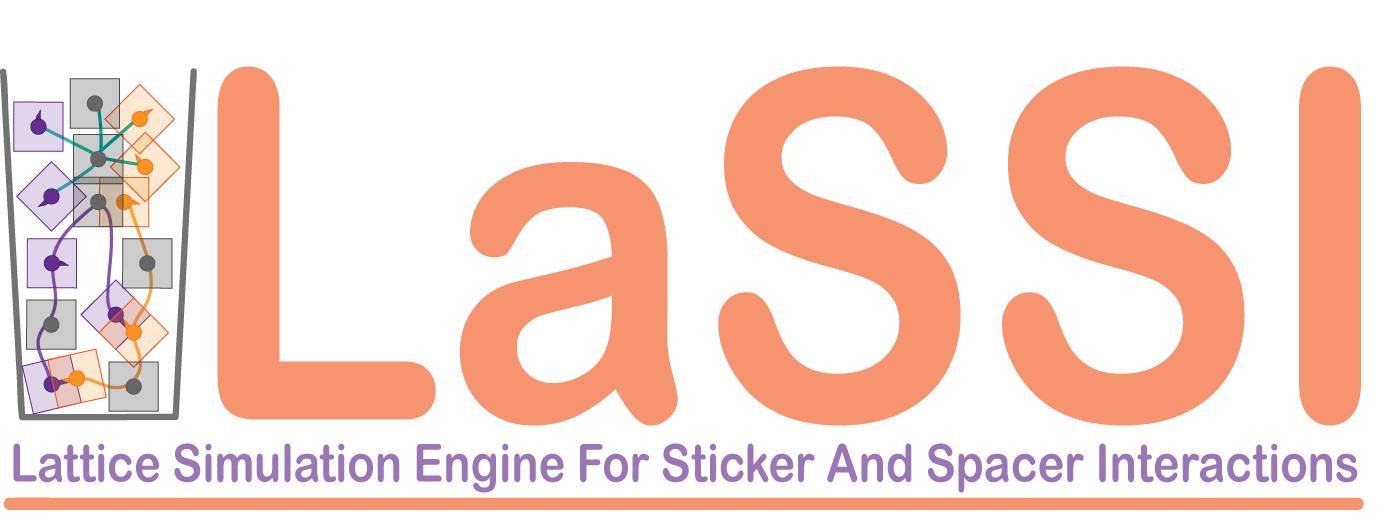
To coincide with Richard and Jeong-Mo meeting up in Korea, the uncorrected proof of Jeong-Mo’s co-first author paper with Furqan was published in PLoS Computational Biology on October 21, 2019. The article may be accessed here: https://journals.plos.org/ploscompbiol/article?id=10.1371/journal.pcbi.1007028. And coincidentally, the Brangwynne lab posted a pre-print on bioRxiv (https://www.biorxiv.org/content/10.1101/809210v1), spearheaded by Josh Riback and in collaboration with the Kriwacki lab, reporting in cell and in vitro measurements that corroborate Furqan’s predictions (see Figure 12 in the Choi & Dar paper). Exciting times all around and an important generalization of saturation concentrations is in the offing. Stay tuned for more…
Jeong-Mo met up with our good friend and collaborator Richard Kriwacki in Daejeon. Richard is visiting Korea to give talks. Looks like good times all around. Discussions about how best to describe the structures of network fluids continue. Stay tuned!!!
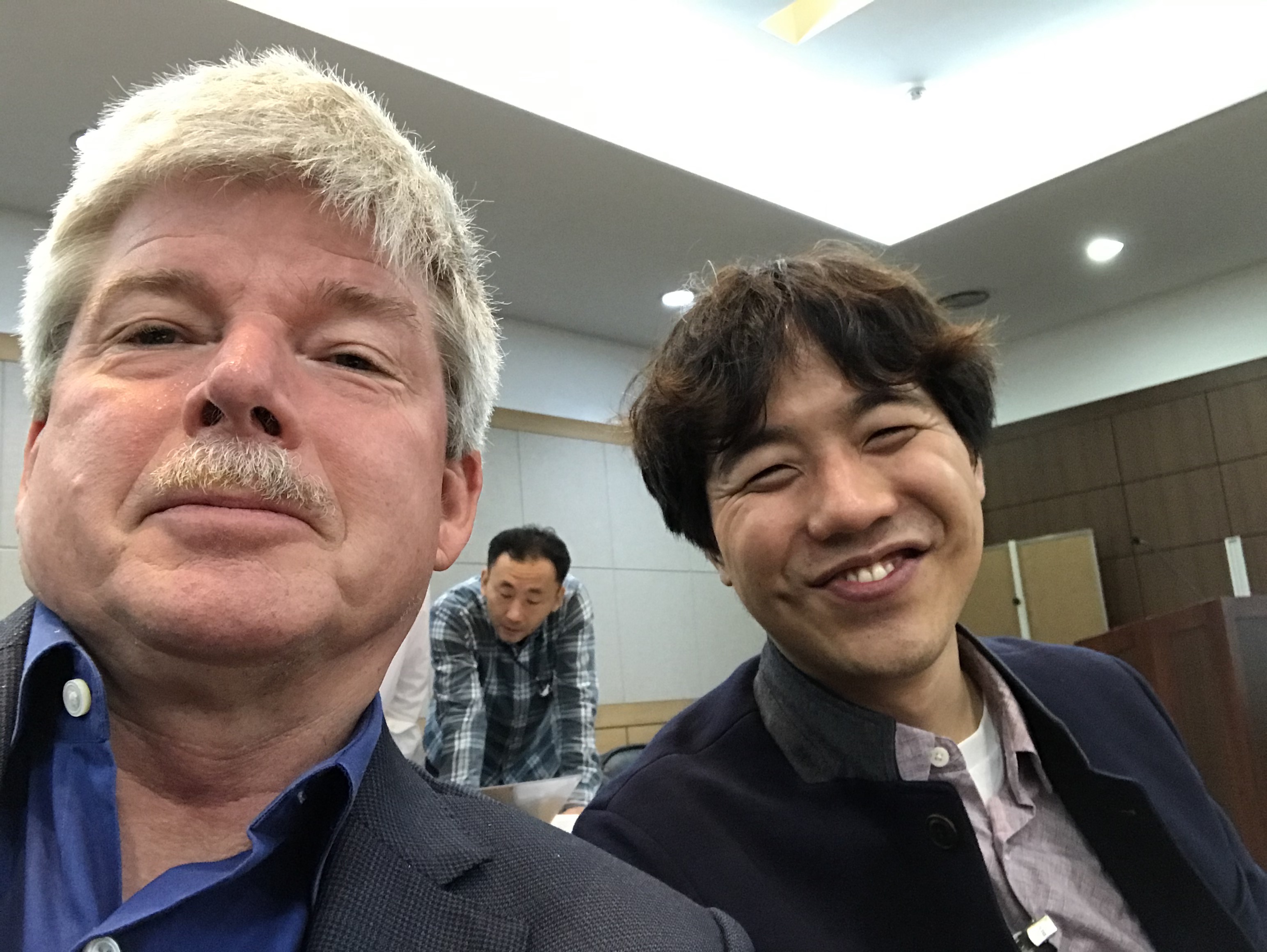
Artur Meller, a third year MD / PhD student in the Computational & Systems Biology program joined the lab for a short fall rotation. He is evaluating us to decide if the fit is good for his PhD work. We are geared up for the scrutiny!!!
Alan Chen from the University of Albany “returned home” to spend time in the lab and tell us about his adventures with parameterizing forcefields for RNA simulations. We learned a lot from Alan and are hoping to embark on a long and productive collaboration with an old friend and dear colleague. The journey begins!!!
A happy and healthy baby boy, Yoan, was born to our dear friend Jeong-Mo and his wife Jessie. Jeong-Mo and Jessie will have their hands full as they raise young Yoan and build their independent careers at KAIST. Congratulations Jeong-Mo and Jessie and welcome to the world Yoan!!!
Anna learned that she has been given admission to the PhD program in the BME department at WashU through the Dean’s Select program. Anna was among several students nominated for this high honor and was chosen for the promise she has shown as a researcher. This means Anna can choose to stay at WashU for her PhD work and do so without the palaver of going through the admissions process. Congratulations Anna!
Furqan’s first paper from the lab was accepted for publication in PLoS Computational Biology. This work, done jointly with former postdoc Jeong-Mo describes a lattice based framework for simulations of phase transitions of associative polymers that fit the stickers-and-spacers model. The algorithm, implemented in a package called LASSI, will soon be made available via Github.
Our collaboration with the lab of Lucia Strader that resulted in a Molecular Cell paper was part of a new story about sticky proteins helping plants to know when and where to grow. This work was driven by Samantha Powers, former PhD student in the Strader lab and redoubtable Alex Holehouse who made the crucial breakthrough insights about IDRs in Auxin Response Factor (ARFs!). Well done Sam and well done Alex.
Randal Halfmann from the Stowers Institute visited us On Friday, August 09 with members of his group. We spent a stimulating day in intense discussions about nucleation, phase transitions, and making sense of the impressive and voluminous data that Randal and colleagues brought along them.
The McKelvey School of Engineering at Washington University in St. Louis released a news item describing Jeong-Mo’s collaborative work with the lab of Fuzhong Zhang - https://engineering.wustl.edu/news/Pages/Synthetic-biology-enables-protein-origami.aspx
We spent a week in Telluride for a lab retreat to discuss what we are doing and where we should be going. The majestic mountains provided the perfect backdrop and a chance to connect with one another in long discussions, over stimulating hikes, engaging card games, and amazing dinners. Thanks to Minerva Pappu for suggesting that Rohit take the lab to Telluride. We got to welcome Matt King into the fold, witness Ammon’s amazing athleticism, Kiersten’s leadership on the frisbee field, and Alex’s talents with the frisbee in hand and instructions as a coach that make him primed for being a PI. We got to hear riveting accounts from Megan about opportunities that abound in the world of bacteria; we heard from Jared about ready to use tools in machine learning; from Furqan and Mina we learned about multidimensional phase diagrams. Kiersten led an impressive discussion about polyphasic linkage. Ammon convinced us that thanks to his creativity, we can see ourselves as a bona fide experimental lab. Xiangze elaborated on novel combinations of theory and simulation to predict phase behaviors and conformational diagrams-of-states for repetitive sequences. Martin revealed his plans for improving upon ABSINTH and uncovering the effects of charge regulation in IDPs. Andrew showed us tantalizing data quantifying the effects of RNA on protein phase behavior and vice versa. Garrett, Anna, and Kasia provided quiet support and engaging discussions. All in all, a rejuvenating retreat and we’ve come back bursting at the seams with ideas galore. And we added a beautiful leonberger (Governor) to the lab mix. Many thanks to Cindy Fusting, Sara Friedberg, and Mark Kozak of TSRC for the use of their facilities for our retreat and helping us with the logistics.
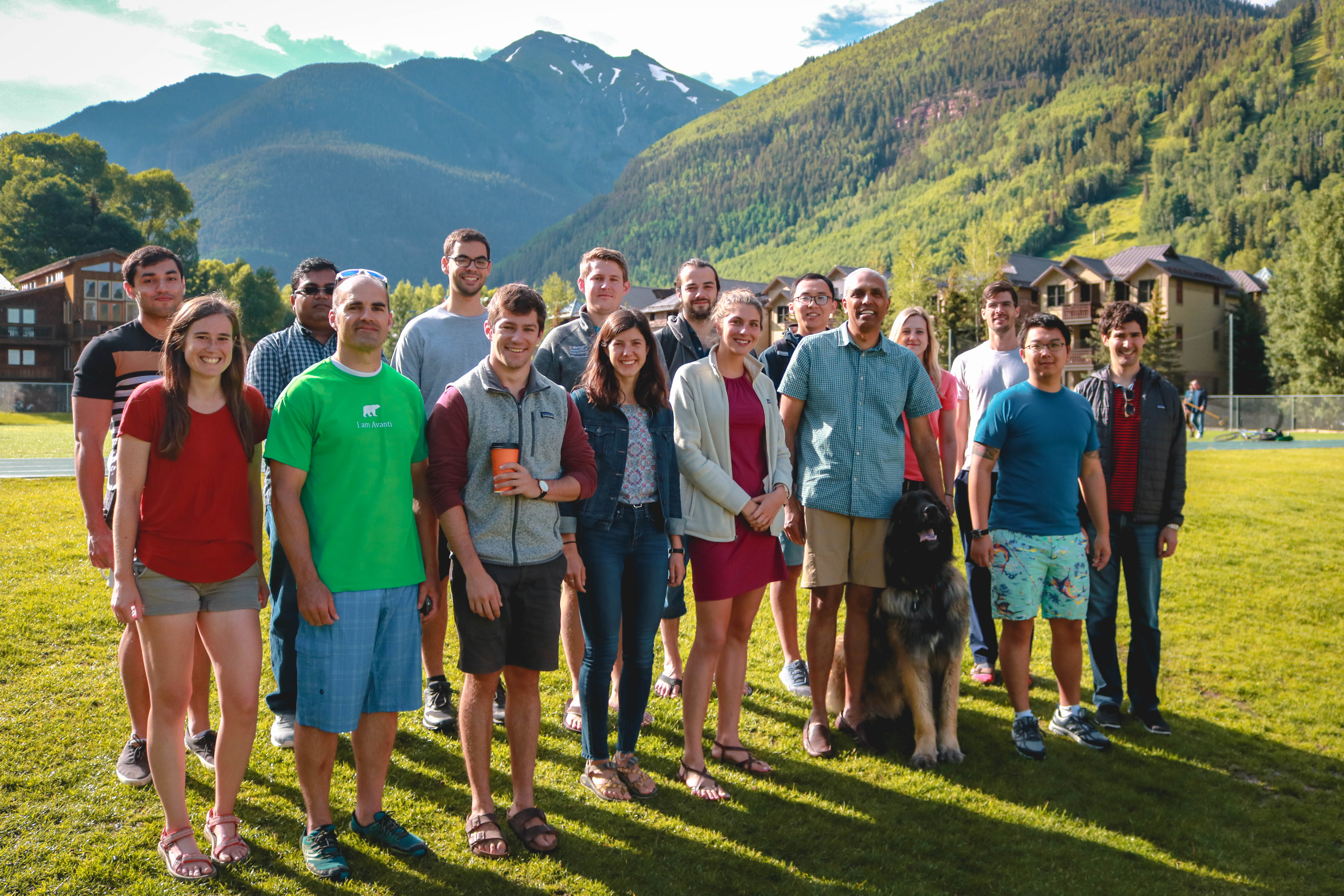
Alex and Rohit attended the Telluride Science Research Conference on IDPs. They’ve also had the good fortune of attending talks that are part of the Macromolecular Crowding TSRC. Rohit spoke about Martin’s work on Charge Regulation Opens New Dimensions For IDPs. Alex spoke about the lab’s work on a Stickers and Spacers Framework for Phase Separation of IDPs. The TSRC is a wonderful event and Telluride is our definition of true paradise. Excellent talks in both conferences and lots of engaging interactions with colleagues from various labs.
Jeong-Mo’s work on modeling of designed single chain nanostructures based on ultrastable proteins, performed in collaboration with and driven by the lab of Fuzhong Zhang in EECE has been accepted for publication in Nature Communications. Congratulations Jeong-Mo and team Zhang!!!
Megan’s first ever first author paper was accepted for publication in Protein Engineering, Design, and Selection. Congratulations Megan!!! This work reports elegant new information theoretic measures that enable comparative assessments of IDPs based on their sequence-ensemble relationships.
Our collaborative work with Samantha Powers and Lucia Strader involving Alex and Rohit was accepted for publication in Molecular Cell. This is an exciting story that highlights the connections between condensates and nucleo-cytoplasmic partitioning in planta. A direct demonstration of how condensates influence biological functions!!!
Martin and Rohit attended the Computational Aspects of Biomolecular NMR GRC in Les Diablerets, Switzerland - the lab’s favorite conference location. Martin presented a poster at the GRS and the GRC about his recent advances on modeling charge regulation in IDPs. Rohit gave two talks, a closing keynote talk in the GRS and an opening keynote talk at the GRC. Thanks to the organizers, Christian Griesinger and Art Palmer for the extremely generous invitation and for organizing a wonderful conference.
We welcomed new people into the team. Moses Chung joined us for a summer rotation. Moses is a rising second year MD / PhD student. Moses is working on deciphering the molecular details of how disordered regions recognize ordered substrates while preserving their disorder. Max deJong, a rising second year Physics PhD student is also doing a summer rotation in the lab. He is working with Ammon on quantifying surface effects of condensates using microfluidics and also the effects of 1,6 hexanediol on condensates. Jeffrey Marek a rising fourth year undergraduate student in BME at WashU is a CSELS summer scholar who is working this summer with Ammon on the effects of profilin orthologs on the aggregation and phase separation of Httex1. And Alex Keeley a rising first year Chemistry undergraduate student at UIUC is working closely with Alex on incorporating various modules into CTraj. It is a busy time and we are having fun with a full lab!!!
Megan attended and presented a poster at the EMBO workshop entitled Bacterial cell division: Closing the gap which was held in Lund, Sweden. She came away with new insights and enjoyed the interactions with a new set of colleagues and collaborators.
Rohit gave an invited talk in Berlin as part of the Cell Symposium on Regulatory RNAs. He spoke about the lab’s recent work aimed at uncovering the molecular grammar underlying protein-RNA interactions that drive condensate formation. Thanks to Nicole Neuman and Ruth Zearfoss from Cell press for the kind invitation and the wonderful opportunity. A great time and a chance to hang with Simon Alberti!!!
Jared received the Gerry and Bob Virgil Ethic of Service Award from the Gephardt Institute for Public Service at Washington University. The video below lays out Jared’s contributions to our community.
Rohit received the 2019 McKelvey Engineering Faculty Award for Excellence in Teaching from Professor Aaron F. Bobick, Dean of Washington University’s McKelvey School of Engineering.
The lab was well represented at the recent Keystone Symposium on Biomolecular Condensates. In attendance were Alex, Ammon, Andrew, Furqan, Kiersten, and Rohit. There were four posters presented, one each by Alex, Ammon, Furqan, and Kiersten. Rohit gave a talk on the first day of the symposium. This, hands down, is the best ever conference we have attended. Thanks to Mike Rosen and Tony Hyman for putting together an exceptional program. Thanks also to the weather for the monumental amounts of snow that made Ammon very happy as he went skiing to his heart’s content. Great science in a spectacular location.
Max who works jointly with us and the Cohen lab was chosen as the recipient of the first annual Outstanding Postdoctoral Mentor or Teacher award. This award is given by the Washington University School of Medicine. Congratulations Max!!!!!
Megan was elected as the graduate student representative to the council of the the Intrinsically Disordered Proteins subgroup of the Biophysical Society. Congratulations Megan!!!
Alex’s collaborative manuscript with the peerless Steven Boeynaems was accepted for publication in PNAS. Congratulations Steven and Alex. This is the lab’s first foray into dissecting the role of RNA on and protein-RNA coacervation on the nature of condensates. Some very clear and quantitative rules have emerged that lay the foundations for what’s to come next. We are excited.
We recently learned that Matthew King, currently a PhD student in the Petry lab at Princeton University, will join us a postdoc starting August 01, 2019. We are thrilled about Matt’s decision and look forward to welcoming him aboard.
The lab was well represented at the 63rd Annual Meeting of the Biophysical Society held in Baltimore between March 02 and March 06, 2019. In attendance were Alex, Ammon, Furqan, Garrett, Jared, Jeong-Mo, Kiersten, Martin, Megan, and Xiangze. Garrett gave a talk in one of the platform sessions on IDPs and all the others presented posters. All presentations seemed to generate a lot of excitement and curiosity. Megan and Jared participated in the SRAA poster competition. They enjoyed the experience and did very well. Overall, well done team Pappu!!! Speaking of Pappu, Rohit gave an invited talk in the symposium on Phase Separation. Following this, he collected his award as 2019 Fellow of the Biophysical Society. The meeting was celebrated with a wonderful meal at Fogo de Cao. We enjoyed watching Furqan do some serious damage!!!! Can’t wait to return to BPS next year, in San Diego!!!
Megan was elected to the leadership board of The BALSA ( Biotechnology and Life Sciences Advising) group, “which is a nonprofit organization that provides consulting services for a variety of clients, ranging from individual faculty members up through multinational corporations”. Congratulations Megan!!! You do us and everyone around you proud!!!!
Alex has accepted an offer to join the Department of Biochemistry and Molecular Biophysics in the School of Medicine at Washington University in St. Louis. In ca. ten months, he will be a tenure-track assistant professor in BMB. Alex will start his new position on January 01, 2020. Congratulations Professor Alex!!! We look forward to seeing your lab take root and grow from strength to strength across the park.
Rohit learned that he will receive the prestigious Mercator Fellowship from the Deutsche Forschungsgemeinschaft (German Research Foundation), which funds visiting Professorships at German universities. As part of this award, Rohit will work closely on a DFG sponsored grant with Professor Dr. Edward A. Lemke (Adjunct Director, Institute of Molecular Biology (IMB) and Professor of Synthetic Biophysics, Johannes Gutenberg University, (JGU), Mainz), Professor Dr. Simon Alberti (Professor of Cellular Biochemistry, Technische Universität Dresden, Center for Molecular and Cellular Bioengineering (CMCB), Biotechnology Center (BIOTEC)), and Professor Dr. Claus A. M. Seidel (Chair of Molecular Physical Chemistry, Heinrich Heine University Düsseldorf). This three-year fellowship will fund regular visits to Mainz, Dresden, and Düsseldorf and will enable collaborative investigations focused on the internal molecular structure of FUS and related proteins in stress granules.
Jared has been chosen to receive the university’s 2019 Gerry and Bob Virgil Ethic of Service Award. He was nominated by the Physics department and chosen for his immense contributions to the outreach activities of the department, mainly through the Young Scientist Program (read more here).
Rohit has been in Dresden. He gave three talks as part of the ten-day long EMBO course on phase separation. It has been wonderful to get to know students from around the world. And he gave a talk as part of the accompanying workshop on Phase Transitions in Polymer and Protein Systems organized by the Max Planck Institute for the Physics of Complex Systems, also in Dresden. Thanks to colleagues and dear friends at the CBG and PKS for this incredible opportunity and kind hospitality. A memorable experience it has been!
Rick Young and Tony Hyman have launched a company, Dewpoint Therapeutics that will target biomolecular condensates using therapeutics. Rohit will be involved in this venture as a consultant and member of the Scientific Advisory Board. The lab will be involved in a collaborative capacity as well. See the announcement here: https://www.biospace.com/article/releases/dewpoint-therapeutics-launches-with-60-million-series-a-to-advance-proprietary-platform-for-drugging-condensates/
Alex visited UT Southwestern in Dallas to give a pair of talks about his work on IDP phase behavior and his plans for the future. Marc Diamond and Michael Rosen were his hosts. Alex had a great time and appears to have made a positive impression on the good people of Dallas!
Alex and Rohit visited returned from Boston where they met up with scientists from the to-be formed Dewpoint Therapeutics. An exhilarating trip and lots of interesting science was discussed.
Jeong-Mo's two recent papers (Improvements to the ABSINTH forcefield for proteins based on experimentally derived amino-acid specific backbone conformational statistics and Experimentally derived and computationally optimized conformational statistics for blocked amino acids) were published online in the Journal of Computational and Theoretical Chemistry. These papers detail the development of brand a new touchstone for calibrating conformational distributions of individual residues - the so-called refined coil library (*RCL) and the development of a ABSINTH-C, a correction version of the ABSINTH forcefield paradigm that leverages CMAP-like corrections derived from the RCL. Congratulations Jeong-Mo! These are going to be important methodological contributions.
Rohit gave a talk at the Cellular and Molecular Bioengineering (CMBE) conference sponsored by the Biomedical Engineering Society (BMES). The CMBE field seems to be interested in going beyond synthetic polymers and embracing the power and versatility of IDPs and biomolecular condensates. Thanks to Debbie Leckband for the kind invitation. A fun time and good chance to catch up with Cliff Brangwynne - the genius!
To our friends, colleagues, and collaborators, Happy New Year from the Pappu lab.
Mina Farag has decided to do his PhD work in the Pappu lab. Mina is an MSTP student and worked with us over the summer of 2018. Welcome aboard Mina!!! We are thrilled to have a true mathematician in our midst. And a biophysicist to boot! May the journey of discovery begin!!!!
Rohit just returned from the Banbury Center meeting on phase separation. Thanks to the organizers for putting together an incredibly stimulating meeting and to the participants for discussions that were edgy and vibrant. The field of phase separations is here to stay and IDPs are getting their due recognition as being important for Biology.
Rohit spent 2.5 days at the Max Planck Institute of Cell Biology and Genetics (MPI-CBG) as part of the institute’s scientific advisory board. This was an incredible experience and Dresden is an amazing place for truly multiscale biology / biophysics.
Jeong-Mo learned that he will receive a travel award to attend and present at the 2019 Annual Meeting of the Biophysical Society. Congratulations Jeong-Mo!!!!
Alex learned that he has been awarded a MolSSI seed software development fellowship from the Molecular Sciences and Software Institute. This fellowship will enable the deployment of Alex’s computational pipeline for modeling IDPs and polymers that undergo phase separation. Congratulations Alex!!!
Rohit attended the annual PI’s meeting of the NSF sponsored Protein Folding Consortium held in Chicago. Thanks to Bob Matthews for organizing a stimulating set of discussions.
Alex visited the Drummond lab to continue his interactions with Allan and coworkers on the evolution of IDPs and the biochemistry of stress response driven phase transitions. Thanks to Allan and colleagues for their kind hospitality.
Alex visited Stanford University to give a talk as part of the postdoctoral seminar series. Thanks to the Stanford IDPSIG (Heather Meyer, Broder Schmidt, Steven Boeynaems and Cesar Cuevas-Velazquez) for the invitation. Alex had a wonderful time making people aware of his work and his future plans. Alex was also hosted by Abby Dernburg at UC Berkeley. He gave a talk in their MCB seminar series. Well done Alex and thanks to Abby for hosting Alex.
Rohit gave the keynote talk at the 2018 Dutch Biophysics Meeting held in Veldhoven. Thanks to Patrick Onck for the kind invitation and introductory remarks, and many thanks to the Dutch Biophysical Society, specifically Tim Vos and Renée Calon, for their kind hospitality.
Max was chosen to give two lectures as part of the Gene Regulatory Networks in Development course at MBL in Woods Hole next week. Congratulations on being chosen Max and break a leg!!!
Alex was part of a collaboration with the group of Daniel Panne. They showed how transcription factor dimerization activates p300, a key regulator of gene expression through chromatin acetylation. Alex contributed important results from simulations. This work was published in the October 15, 2018 version of Nature. Alex’s contributions were featured in a WashU press release .
The lab’s collaborative work on partially ordered polymers (POPs), an effort spearheaded by WashU BME alum Stefan Roberts from the Chilkoti lab at Duke was published in the October 15, 2018 issue of Nature Materials. Tyler’s clever coarse-grained simulations helped explain the source of tunable hysteresis in these POPs. Congratulations to team Chilkoti and thanks for the collaboration. This work was featured in a press release from Duke University and one from WashU as well.
Conor learned that he has been matched with the Kent and Bonnie Lattig Fellowship in the Center of Biological Systems Engineering. This fellowship will provide partial support for his PhD training. Congratulations Conor!
Rohit received news that he has been named a 2019 Fellow of the Biophysical Society for "ingeniously implementing polymer physics approaches and molecular simulations to characterize intrinsically disordered proteins". Read the official announcement here!
We welcomed Catherine (Kasia) Kornacki to the lab. She joins the group of experimentalists as a lab technician and will support the efforts of Ammon, Megan, Andrew, and Anna. We also welcomed Garrett Ginell who will spend his gap year before graduate school as a junior research scientist. He will work closely with Alex on projects related to computational approaches for modeling and quantifying disordered regions using low resolution data.
We and our loved ones are dedicated to Biophysics (and eating and sleeping as well).
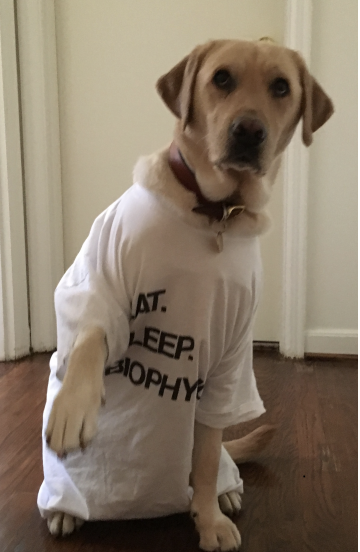
We recently learned that Scott Crick, lab alumnus and the man who pioneered experimental work in the lab, will move from his current position at the Office of Technology Management at WashU to become Director of Research and Applications at Auragent Biosciences, a start-up company founded based on one of Dr. Srikanth Singamaneni’s technologies (see here). Scott’s office will be in the Cortex building and he will be spending quite a bit of time in Srikanth’s lab, so he will be in our neighborhood quite often. Congratulations Scott! It is nice to see talent from the lab making headway as entrepreneurs!
The lab’s collaboration with the Hyman and Alberti labs was highlighted by WashU.
Alex, Ammon, Jeong-Mo, Kiersten, Martin, Max, Megan, and Rohit traveled to Les Diabrelets, Switzerland for the Intrinsically Disordered Proteins GRC. In addition, Alex chaired the Gordon Research Seminar (GRS) that preceded the GRC and was attended by Ammon, Kiersten, Martin and Megan. As well as presenting posters, Megan gave an invited talk at the GRS focused on her work on the impact of C-terminal tails of FtsZ.
At the GRC, Alex, Ammon, Jeong-Mo, Kiersten, Megan, Martin, and Max presented posters. Alex presented PIMMs, the comprehensive engine for calculating phase diagrams of coarse-grained bead-spring polymer models of proteins. Ammon presented his work on extracting information regarding nucleation barriers from DAmFRET data. Jeong-Mo presented LASSI, a lattice model designed to predict the phase behavior of associative polymers using a stickers and spacers model. Kiersten presented her insights regarding polyphasic linkage and ways to design ligands for targeting Httex1. Martin presented his developments of a novel engine for capturing the effects of pKa shifts in ABSINTH. Max summarized his work on transactivation domains and Megan introduced new information theoretic measures for comparative assessments of sequence-to-conformation relationships of IDRs. As well as presenting her poster, Kiersten gave a talk on her work on understanding how profilin interacts with Httex1. Megan was elected to chair the 2020 edition of the IDP GRS. Congratulations Megan!!! Alex won one of the three awards given out to postdocs for best poster. Congratulations Alex!!! Finally, Rohit gave a talk in the session on Physical Principles of Intracellular Phase Transitions. A successful pair of meetings in a beautiful setting!

We learned that our collaborative work with the Chilkoti lab at Duke University on the design of partially ordered elastin-like protein polymers leading to programmable hysteretic phase behavior was accepted for publication in Nature Materials. This incredible collaboration involved the thoughtful and immense contributions from Stefan Roberts (Chilkoti lab PhD student and WashU BME alum) and Tyler Harmon (well known savant of coarse grained simulations). Congratulations to all and we look forward to the follow-up theory work from Tyler!
We welcomed Mina Farag into the fold. Mina is an MSTP student who matriculated from Johns Hopkins and he will be working on field theoretic calculations of the dynamics of phase separation and gelation. Additionally, we are pleased to welcome Anna Eddelbuettel a rising third-year undergraduate student in BME who is working closely with Megan in the wet lab, and Minerva Pappu a rising first-year CSE and Physics undergraduate student who is working with Ammon on microfluidic platforms for droplet characterization.
Martin Fossat and Furqan Dar attended the 2018 Meeting of the Protein Folding Consortium in Ann Arbor at the University of Michigan. Martin was on the program committee for the PFC and he presented a poster on his contributions to generalizations of ABSINTH. This PFC was Furqan’s first conference as a member of the Pappu lab.
We learned that our collaborative work with Jie Wang, Simon Alberti, and Tony Hyman was accepted for publication in Cell. Congratulations to team Alberti-Hyman-Pappu and to Jeong-Mo and Alex for important collaborative contributions and novel insights regarding the molecular grammar for the driving forces of FET / FUS family proteins. An incredible team effort powered by Jie’s herculean drive.
Kiersten, Megan, Alex, Jeong-Mo, and Rohit attended and participated in the EMBO | EMBL symposium on Cellular Mechanisms Driven by Liquid-Liquid Phase Separation in Heidelberg, Germany. It was an enlightening, stimulating, and deeply profound experience to be immersed in three full days of talks, interactions, and poster presentations on our favorite topic. Thanks to Edward Lemke, Tanja Mittag, Cliff Brangwynne, and C.P. Heisenberg for organizing an incredible symposium and to Tim Nuernberger for taking care of all of the logistical details. Kiersten gave a short talk. Megan and Alex were selected to participate in the pre-meeting postdoc / graduate student symposium. Alex, Megan, and Jeong-Mo presented posters, while Rohit gave an invited talk. We shall live off all that we learned for a while to come!!!
We are excited to welcome Andrew Lin as thew newest graduate student in the lab! Andrew comes to us from the plant and microbial biosciences (PMB) graduate program, and obtained his bachelors of science from UC Berkeley. He will further strengthen the lab's experimental work. Welcome Andrew !!!
Rohit visited Princeton to give a talk in their Bioengineering Colloquium series. Thanks to Cliff Brangwynne and members of the Brangwynne lab for wonderful discussions and kind hospitality. The visit was a memorable one!
Alex returned from Barbados where he attended and spoke at the 2018 Physical Basis of Cellular Adaptation and Memory meeting. Thanks to Jackie Vogel and Simon Alberti the invitation and for organizing a truly remarkable meeting.
Mary has decided to join the Systems Biology PhD program at Harvard University. Congratulations Mary!!! We look forward to following your career and hearing about your scientific advances.
Mary received news that she is an awardee of the National Science Foundation’s 2018 Graduate Research Fellowship Program. This three year fellowship provides Mary with funds to pursue her PhD studies in Bioinformatics & Computational Biology at an institution of her choosing - and she does have rather a lot of excellent choices! Congratulations Mary!!! It has been a privilege to have you work with us over the past five years and we look forward to many more advances and accomplishments from you.
Ammon’s paper 'Profilin reduces aggregation and phase separation of huntingtin N-terminal fragments by preferentially binding to soluble monomers and oligomers' was chosen by the editors of J. Biol. Chem. to appear in a special virtual issue on Amyloids, prions and protein oligomers at JBC. The editors 'looked through hundreds of papers to come up with what' they 'felt best represented the exciting advances made in functional and disease-related protein aggregation over the last three years…', Congratulations Ammon and congratulations Kiersten. Your hard work on a challenging problem has been recognized. This special issue can be accessed here.
Kourtney has decided to pursue her graduate work at the University of Chicago. Congratulations Kourtney!!! We look forward to important discoveries emanating from your efforts!
We are pleased to welcome Xiangze Zeng as a new postdoctoral member of the lab. We look forward to many stimulating discussions and projects together. Welcome Xiangze !!!
Megan has been awarded an EMBO/EMBL Symposium Fellowship (travel grant) to attend the EMBO/EMBL symposium on Cellular Mechanisms Driven by Liquid Phase Separation, which is to be held in Heidelberg, Germany between 14th and 17th of May, 2018. She will present a poster on her FtsZ work. Congratulations Megan !!!
Kiersten was selected, based on her submitted abstract, to give a talk at the upcoming EMBO/EMBL symposium on Cellular Mechanisms Driven by Liquid Phase Separation, which is to be held in Heidelberg, Germany between 14th and 17th of May, 2018. Well done Kiersten !!!
Rohit attended and gave an invited talk in the Huntingtin Structure and Function session at the 13th Annual CHDI conference on Huntington’s Disease Therapeutics Conference in Palm Springs, CA. Kiersten’s structural work performed in collaboration with the Lashuel, Lemke, and Hatters labs as well as Ammon’s recent efforts to extract phase behavior and the impact of profilin binding on Httex1 phase boundaries featured prominently in Rohit’s talk. Kiersten attended the entire conference and presented a very well received poster. Kudos Kiersten!!! News about Day 3 of the conference, highlighting some major discoveries in the field may be found on the HDBuzz website.
Nil Gural, lab alum and PhD candidate in the Bhatia lab, Medical Engineering & Medical Physics program at Harvard-MIT, recently published an important paper in Cell Host & Microbe demonstrating her ability to engineer a dormant version of the malarial parasite. A write up of Nil’s work was featured in a press-release from MIT. Congratulations Nil, and we look forward to continuing insights from your path breaking advances!
Our CIDER paper was highlighted as one of the Biophysical Journal's Best of 2017!
The lab was in full force at the 62nd Annual Meeting of the Biophysical Society, held this year in San Francisco, with Rohit, Alex, Ammon, Jeong-Mo, Kiersten, Megan, Martin, and Mary all in attendence. Ammon, Megan, Martin, and Mary presented posters about their new results, while Alex, Jeong-Mo, and Kiersten gave talks.
Jeong-Mo was selected to give a postdoctoral presentation at the 2018 Annual IDP subgroup meeting of the Biophysical Society. He is scheduled for a 15 minute talk (plus 5 minute questions) on Saturday February 17th. Congratulations Jeong-Mo!!!
Alex and Rohit attended the 2018 Protein Folding Dynamics Gordon Research Conference in Galveston, TX. Many thanks to Ben Schuler and Margaret Cheung for organizing a truly fantastic meeting! Rohit chaired a session entitled Intracellular phase separation: A new paradigm of protein assembly. Alex gave a short talk in this session - selected from the abstracts - on the lab’s work in collaboration with Erik Martin and Tanja Mittag from St. Jude Children’s Research Hospital. Alex showed how single chain properties of the hnRNPA1 low complexity sequence determine emergent properties such as phase behavior. The talk was well received. Well done Alex!!!
The lab’s collaborative work with the Alberti lab in Dresden was the topic of a recent news item.
Rohit contributed a blurb to the Principles of Systems Biology (No. 24) section of Cell Systems highlighting Tyler’s work on the role of disordered linkers as determinants of phase transitions in linear multivalent proteins.
The Pappu lab wishes all colleagues, collaborators, friends, and well-wishers a very Merry Christmas!
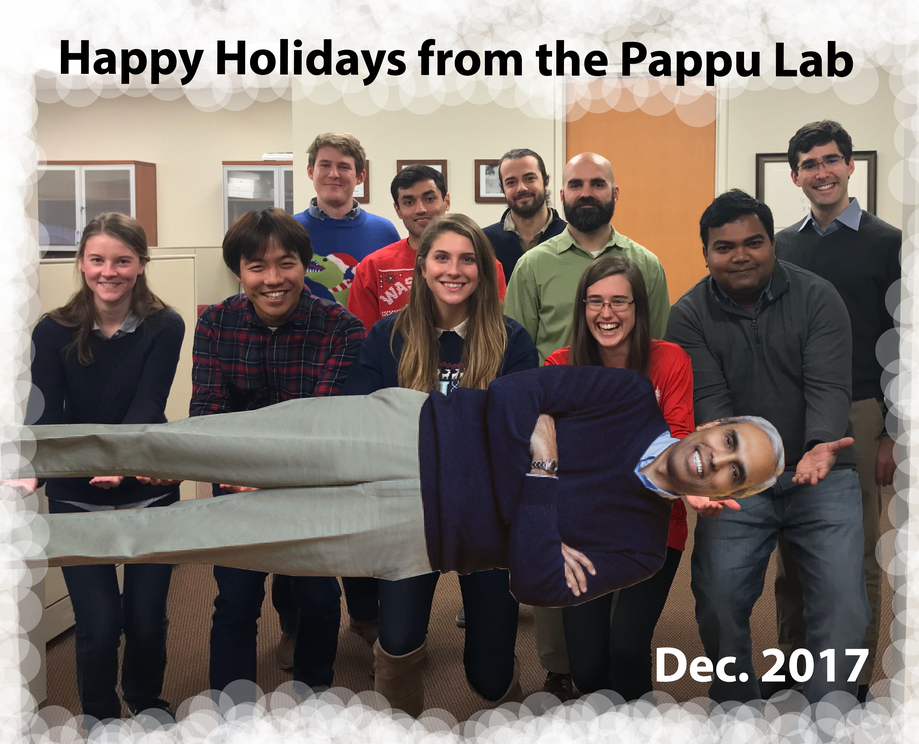
Rohit traveled to Mumbai. He’s been mixing work with family time, and come Dec 24th, he switched off to take in the intrinsic familiarity of the motherland and the joys of being with family. From India, Merry Christmas everyone!
Rohit headed to Delhi to participate in the Washington University forum for India. Although he had no official role to play, Rohit enjoyed being in the audience and learning about the environmental challenges posed by particulate matter. There might be exciting avenues to consider for the lab in this area. Stay tuned!!!
Rohit spoke at the 2017 International Conference on Intrinsically Disordered Proteins that was held at IISER Mohali, in India. Thanks to Dr. Samrat Mukhopadhyay for organizing a wonderful conference and to all the volunteers from Samrat’s lab for attending to all the minutiae of organizing a successful conference. The science was enthralling and the setting was stimulating. Rohit got a glimpse of the Indian and Sri Lankan cricket teams at the hotel and this may have been the true highlight of the conference!!!
Rohit heads off to the motherland, India to give talks at various places including the international conference on IDPs being held at IISER Mohali. Happy travels!!!
Kiersten, Megan, Mary and Alex returned from the annual ASCB meeting in Philadelphia. Kiersten, Megan and Alex presented posters. The lab’s first ASCB meeting ever. Worth returning for sure! Lots learned, lots to do!
Max’s paper driven by his active collaboration with Alex and guided by initial designs by Rahul on the problem of intrinsically disordered transactivation domains of transcription factors was accepted for publication in Cell Systems. Congratulations team Cohen and team Pappu. Barak Cohen and Rohit are now co-authors with Max, Alex, and Rahul. In Barak’s words, this makes us all “goombahs"!
The lab’s collaboration with the Alberti group at the Max Planck Institute in Dresden has yielded the first paper with Titus Franzmann as lead author from Simon Alberti’s lab. The work on Sup35 droplet formation was recently accepted in Science. Congratulations Titus from Simon’s lab and awesome evolutionary detective work by Alex!
A recent press release discusses findings from Tyler’s eLife paper has been published online.
Rohit returned from the annual meeting of the ASCB where he gave a talk as part of the symposium sponsored by the the Build the Cell subgroup. Thanks to Stephanie Weber and Susanne Rafelski for the opportunity to speak.
Dr. Xiangze Zeng from HKUST in Hong Kong will join the lab as a postdoc. We look forward to welcoming Xiangze in March 2018!
Tyler’s manuscript detailing the connections between gelation and phase separation and the role of disordered linkers in modulating the nature of phase transitions in linear multivalent proteins has been accepted for publication in eLife. Congratulations Tyler!!!
Alex spoke on his work developing numerical and theoretical descriptions of phase separation at the 2017 IDP CECAM workshop in Paris, France. Many thanks to the organizers for the invitation, and for a truly fantastic week of science, food, and collaboration!
The lab’s collaborative work monomeric huntingtin, driven by Kiersten working in close collaboration with John Warner IV in the Lashuel lab and Piau Siong Tan in the Lemke lab, was featured in C&E news. This work was further highlighted in a recent article from Washington University, emphasizing the importance of this discovery in providing a greater understanding of how and why mutant huntingtin may drive disease progression in Huntington's disease.
The lab celebrated Rohit's birthday by assembling "liquid droplets" and "fibrils" made of balloons in his office. There was also cake. Happy birthday Rohit!
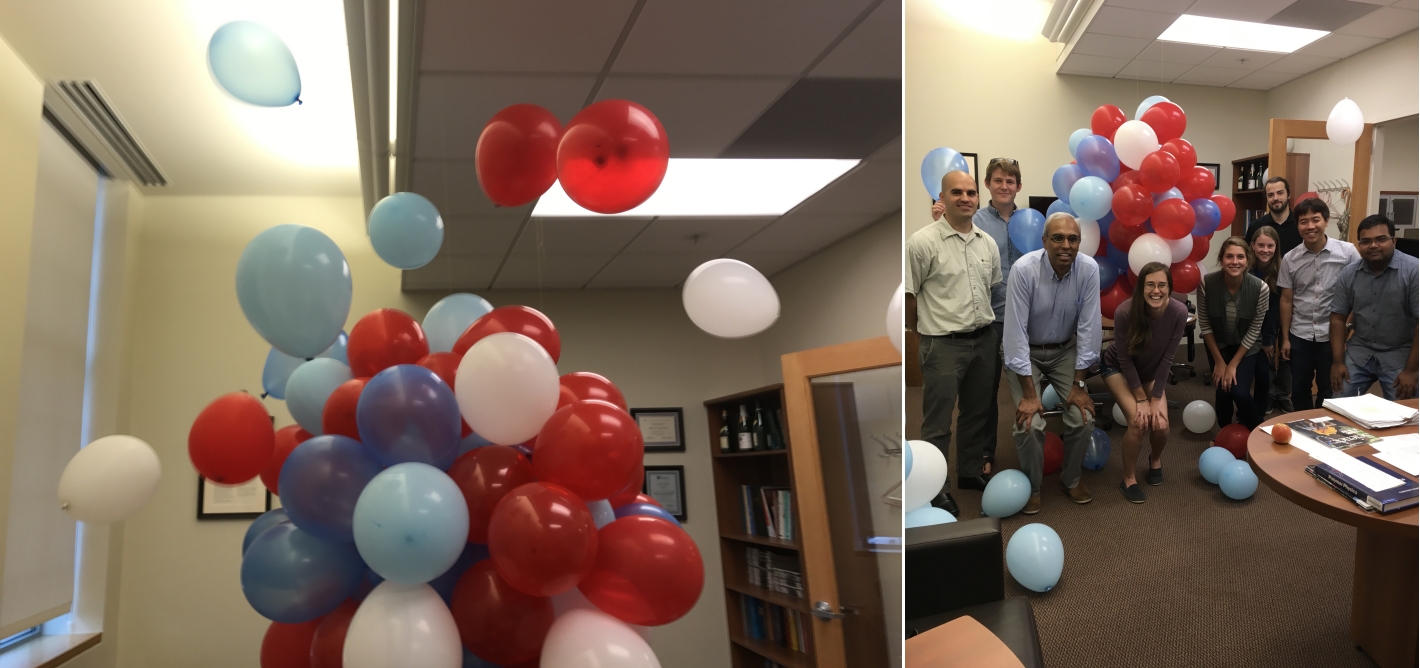
Rohit returned from Duke University where he met up with Cliff Brangwynne, Ashutosh Chilkoti, Allan Drummond, Amy Gladfelter, and Tanja Mittag to kibitz about ways to leverage new advances in the field of intracellular phase transitions for collaborative projects aimed at reprogramming cells. Thanks to Tosh Chilkoti for being a wonderful host. PI’s lab meeting was loads of fun!!!!
Kiersten’s collaborative manuscript with John Warner from the Lashuel lab and Piau Siong Tan from the Lemke lab was recently accepted for publication in the Journal of the American Chemical Society. This work provides the first ever account of the overall structure of the exon 1 encoded region of monomeric huntingtin as a function of polyglutamine length. The results are striking and surprising, showcasing the teamwork needed across three different labs to solve a long-standing problem.
Rahul’s collaborative work with Kate Sherry and Doug Barrick from Johns Hopkins was recently accepted for publication in PNAS. This work describes the impact of charge patterning in the intrinsically disordered RAM region of the Notch intracellular domain on transcriptional regulation by the Notch receptor. We have a special fondness for this system: It is one studied by our dear friend Doug Barrick and the anomalies Rahul discovered in simulations of the Notch-RAM polyampholyte gave birth to the concept of kappa. Congratulations Rahul and team Barrick!!!
A recent news article highlighting the lab’s collaboration with the Chilkoti and Zauscher labs at Duke on the NSF sponsored DMREF project was published online.
We recently learned that the NSF will fund a collaborative research program under the Division of Materials Research’s program to Design Materials to Revolutionize Engineering in the Future (DMREF). This grant will fund a collaboration among three labs: the Chilkoti lab at Duke, the Zauscher lab at Duke, and the Pappu lab.
We convened at the Knight center on campus for our annual lab retreat. Thanks to Kiersten and Ammon who were the primary organizers of the retreat and did an incredible job of covering a range of topics through the day. Nearly 11 hours of intense discussions of where we are and where we are going fueled by coffee, sugar, food, and the lab’s favorite: soft serve ice cream! We look forward to seeing what comes of the annual pow-wow!
Rohit returned from Telluride following the TSRC on Intrinsically Disordered Proteins. A wonderful meeting in a wonderful setting. Thanks to Richard Kriwacki and Arvind Ramanathan for organizing, and thanks to all the participants for stimulating talks and discussions. Lots to learn and lot more to do in the exciting intersection between IDPs and phase transitions and in bettering our understanding of the impact of conformational heterogeneity on function.
The lab’s work on the surprising phase behaviour of LAF-1 in collaboration with the Brangwynne lab was published in Nature Chemistry, and the school of engineering & applied sciences wrote about this work in a news feature.
Rohit gave a talk at the Proteins Gordon Research Conference in Holderness, NH. He spoke about Tyler’s work on the influence of disordered linkers on the coupling between phase separation and gelation in multivalent proteins. Jeong-Mo, Martin, and Jared attended the GRC as well. Jeong-Mo presented a poster and reported results regarding his new c-ABSINTH forcefield, while Martin was co-chair of the GRS. Many thanks to Cathy Royer for organizing a wonderful conference!
Rohit, Kiersten, and Ammon returned from Steam Boat Springs, CO following the FASEB Science Research Conference on Protein Aggregation in Health & Disease. Rohit was the primary organizer of this conference and worked closely with Dr. Christina Sigurdson from UCSD who was the co-organizer. The conference, by many measures, was a success and special thanks are due to the invited speakers and participants who made this event a success. Kiersten gave a short talk on the lab’s collaborative work on the joint experimental and computational characterization of the structural features of the monomeric ensemble of Httex1. Her talk was very well received. Kiersten also took charge of the A/V setup at the conference. Thank you so much Kiersten for your dedication and earnest effort. It went swimmingly well. Ammon presented a poster on progress he is making to develop an adaptation of classical nucleation theory for describing the kinetics and thermodynamics of supersaturated aggregation reactions in living cells. This work is being done in collaboration with the Halfmann lab.
Kiersten’s tour de force work in collaboration with the Svergun and Lemke labs was accepted for publication in PNAS. In this work, Kiersten deployed a novel maximum entropy method to uncover a clear explanation for the long-standing, and vexing problem of discrepant inferences regarding chain dimensions of IDPs and unfolded proteins derived from SAXS and smFRET measurements. Well done Kiersten and congratulations to all labs involved in this gargantuan collaborative effort!!!
We recently learned that Rahul Das, an important alumnus of the lab, will be moving to a new position as Senior Research Scientist at GNS Healthcare in Cambridge, MA. Congratulations Rahul!
Megan gave a talk at the annual meeting of the NSF-sponsored Protein Folding Consortium that was held in UC Berkeley. She presented her recent results on the auto-regulation of FtsZ polymerization and GTP hydrolysis that is mediated by the C-terminal tail. Her work was featured in the session on evolutionary determinants of protein structure and function.
Rohit was asked by Alzforum to comment on the recent paper by Jain and Vale on the phase separation of RNA repeats. Alzforum is a networking site that discusses research relevant to neurodegenerative disorders. This site also has a story on the recent conference on Leuven on Phase Transitions in Biology and Disease.
Alex successfully defended his thesis - a tome really - and enthralled the community of biophysics researchers with a high-level "Ted talk" like presentation of the overall impact of his thesis work. Congratulations Dr. Alex!!!
Ammon, Jeong-Mo, and Rohit returned from Memphis following inaugural symposium of the St. Jude Research Collaborative on Membraneless Organelles that is funded by St. Jude Children’s Research Hospital. The symposium entitled The Biology of Liquid Organelles was held at the Marlo Thomas Center at St. Jude in Memphis on May 18, 2017. The St. Jude collaborative brings together five labs including the Brangwynne lab at Princeton, the Kriwacki, Mittag, and Taylor labs at St. Jude, and ours. Jeong-Mo and Rohit gave talks at the inaugural symposium and this event was followed by a day of intense deliberations to map prospective collaborations within the group of labs in the collaborative. A huge thanks to St. Jude for their incredible leadership and prescience and special thanks to our colleagues at St. Jude led by J. Paul Taylor for including us in this important enterprise and adventure.
Kiersten successfully defended her thesis on May 11th. Her presentation was spell-binding, capturing the intricate complexities of her work in an accessible and compelling manner, and she passed with flying colors! Congratulations Dr. Kiersten!!!
Rohit spoke at a symposium organized by the committee on Genetics, Genomics, & Systems Biology at The University of Chicago. The theme for the symposium was 'A new frontier in cellular structure and function'. Rohit was one of the four invited speakers. Thanks to D. Allan Drummond for organizing a fantastic symposium and for being a wonderful host. Thanks also to Geraldine Seydoux, Amy Gladfelter, and Simon Alberti for wonderful talks and stimulating discussions. In the words of Allan Drummond 'the sense of watching a field develop was excitingly palpable'.
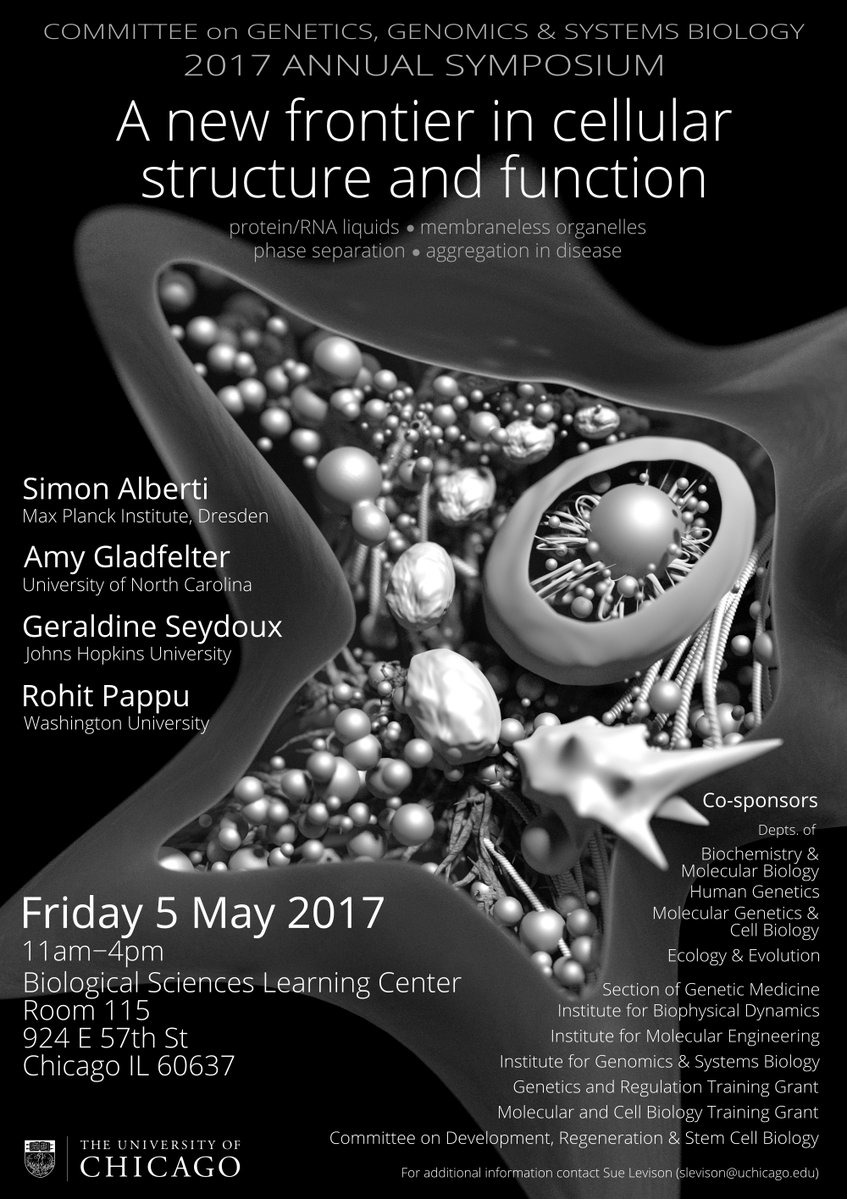
Rohit returned from Leuven, Belgium where he gave a talk as part of the symposium on Phase Transitions in Biology & Disease. Thanks to the organizers for a stimulating symposium.
Tyler successfully defended his PhD thesis in Physics. His talk captured his novel insights into the rules that govern spatial organization in phase separated systems, providing an elegant synthesis of an illustrious graduate career. Congratulations Dr. Tyler!!!
Alex and Rohit worked closely with Steven Wei, Shani Elbaum, and Cliff Brangwynne to uncover the sequence-encoded phase diagram for LAF-1, an archetypal phase separating protein that encompasses a disordered RGG domain and RNA binding helicase domains. This work, which was driven by novel ultrafast scanning FCS measurements by our colleagues in Princeton, provides the first direct connection between sequence-encoded disorder and phase behavior. The short answer, *fluctuations matter!!!* This work was accepted for publication in Nature Chemistry.
Rohit gave the BMCE Distinguished Lecture in the Department of Biomedical and Chemical Engineering at Syracuse University on April 21, 2017. Thanks to a friend and colleague, Radhakrishna Sureshkumar for the invitation and hosting a wonderful visit.
Megan recently learned that she has received a travel award from the Department of Biomedical Engineering at Washington University to attend the annual BMES meeting in Phoenix, AZ to be held between October 11th and 14th, 2017. Congratulations Megan!!!
Rohit returned from UC Berkeley where he gave a talk in the MCB department on the lab’s work on IDPs. Thanks to Susan Marqusee for hosting a wonderful visit and thanks to colleagues at Berkeley for insightful discussions.
Rohit returned from a trip to San Francisco where he gave a talk about sequence encoded phase transitions mediated by disordered proteins as part of the symposium on Coacervation that was organized by Paul Dubin and Russell Stewart at the 253rd Annual Meeting of the American Chemical Society. The symposium provided a wonderful learning experience and Rohit is grateful for the invitation to attend and present.
We recently learned that the Human Frontiers Science Program (HFSP) that funds frontier research into complex biological systems will fund our collaborative research with the Michnick and Alberti labs. The project is entitled Elucidating the molecular logic of membrane-free compartment function and assembly. We are excited about embarking on this collaborative with two superb labs. For more details, please see the HFSP website or the Washington University press release.
Rohit visited the Hospital for Sick Kids in Toronto to give a talk as part of the Molecular Medicine seminar series. All thanks to Julie Forman-Kay for organizing a stimulating visit and for all the rich insights about a diverse array of systems - all of interest to the lab.
We welcome Martin Fossat who joined the lab as a freshly minted postdoc. Martin will work on various aspects pertaining to the accurate modeling of IDP ensembles and uncovering the synergies between IDRs and folded domains in tethered systems. Welcome Martin!!!
We are happy to announce that we are now part of a collaborative research consortium funded by St. Jude Children’s Research Hospital (SJCRH). The goal of this consortium is to further our understanding of the physical determinants and functions of various protein / RNA membraneless organelles. The consortium, which is led by J. Paul Taylor (SJCRH and HHMI), brings us together with the Kriwacki lab and Mittag lab at SJCRH, and the Brangwynne lab at Princeton University.
Alex learned that he will be one of the recipients of this year’s Spencer T. and Ann W. Olin Fellowship. The Olin Fellowships were created by a generous gift from the Olin Foundation. The purpose of the gift is to promote the training of doctoral students in the biomedical sciences. In recognition of this gift, the Medical Scientist Training Program established the Olin Fellowships in 1987. Olin Fellows are “recognized for past achievement and the promise of a distinguished career in the biomedical sciences”. Alex is being recognized for his PhD work in the lab and beyond on the topic of Sequence-Encoded Conformations and Phase Behavior of Intrinsically Disordered Proteins. Congratulations Alex!!!
Alex, Ammon, Jeong-Mo, Megan, Kiersten, and Tyler attended, participated in, and presented at the 61st annual meeting of the Biophysical Society in New Orleans. Alex was chosen to co-chair a platform session on IDPs and present a platform talk as part of this session. He gave his talk on collaborative work with the Raleigh lab on the unfolded state of NTL9 under folding conditions. Kiersten presented a poster on her recent modeling work on Htt structure performed in collaboration with the Lashuel lab and her explanation of Ammon’s data for the modulation of Htt phase behavior by profilin via polyphasic linkage. Ammon presented a poster on the impact of preferential protonation of Glu residues in repetitive polyampholytic sequences as drivers of helix formation through disorder to order transitions. Jeong-Mo presented his new bespoke lattice model that enables the modeling of random phase aggregation and fibril formation by hompolypeptide sequences such as polyQ and polyN. Megan presented a poster with an integrative story, combining her new data, on how the disordered linker of FtsZ influences polymerization, ring formation and cellular phenotypes. Last and by no means the least, Tyler presented insights from his coarse-grained simulation approach designed to explain the sequence-encoded design of hysteretic behavior in thermally responsive copolymers of elastin-like polypeptides interspersed with polyalanine domains. This work is being performed in collaboration with the Chilkoti lab.
Tyler received the SRAA poster award at the 61st annual meeting of the Biophysical Society sponsored by the IDP subgroup for his work on the sequence encoded design of thermally responsive phase behavior, thus keeping alive the lab’s streak of receiving recognition in SRAA competitions that dates back to 2011. Well done Tyler!!!
Rohit visited McGill University to give a talk. The interactions were excellent. Thanks to Jackie Vogel for organizing a wonderful visit.
Happy new year from the Pappu lab!
Susana Barrera Vilarmau spent more than three productive months in the lab. She now returns to Barcelona to complete her PhD studies. Thanks Susana for the good times and for your insightful contributions to the lab. We will miss you!
Rohit returned from Princeton where he spent 2.5 amazing hours with Cliff Brangwynne’s lab, long stimulating hours of discussions with Cliff Brangwynne, and an overall incredible visit to Princeton. Thanks a ton to Cliff, the Brangwynne lab, and members of the CBE department for a memorable visit.
Rohit was invited to give two talks at the Tata Institute for Fundamental Research in Mumbai, India. On Friday, November 04 he gave a tutorial talk entitled "Essential Concepts of Proteins as Polymers". On Monday, November 07, he gave a talk on the lab's work on IDPs entitled "Form and Function of Intrinsically Disordered Proteins". All thanks to Sudipta Maiti for organizing a wonderful visit.
Rohit and Tyler attended and participated in the 3rd International Symposium on Protein Folding hosted by the National Center for Biological Sciences in Bangalore, India from November 8th - 11th. Rohit grew up in Bangalore, so it was nice to be back on old stomping grounds. Tyler gave a talk entitled 'Charge neutralization contributes to single alpha helix formation in charge patterned sequences'. Tyler's talk was very well received and was the subject of active discussion. Well done Tyler!!! During the first half of the symposium Rohit presented a tutorial entitled 'Computational methods for simulations and sequence analysis of (intrinsically disordered) proteins'. Rohit also presented results on our work on protein unfolded states in a talk entitled 'Unfolded states of proteins under folding conditions'. Overall, a stimulating, exciting, and exhausting trip. All thanks to Jayant Udgaonkar and Bob Matthews for organizing a wonderful symposium.
The Cubs win the world series and Kiersten celebrates with them!

Sang Eun Jee, joins the Pappu lab as a postdoctoral fellow from Georgia Institute of Technology, where she was previously a postdoctoral fellow with Seung Soon Jang in the School of Materials Science and Engineering. Sang Eun will be exploring the determinants of fibril formation in phase separating systems, and work on de novo design of peptide based biomaterials. Welcome Sang Eun!
On Saturday, October 21st, Alex Holehouse gave a talk at the 23rd Annual Retreat of the Computational & Molecular Biophysics Program. He talked about his collaborative work with the Brangwynne lab. The title of his talk was Phase separation of intrinsically disordered proteins yield "empty" liquids. Alex received the award for the best talk at the retreat. Congratulations Alex!!!
Published work by Tyler Harmon describing his GADIS algorithm for designing disordered proteins with target levels of intrinsic helicity has been recommended by F1000. Congratulations Tyler!!!
Tyler Harmon visited the Max Planck Institute in Dresden. He gave a talk on his work that has uncovered the physical principles that underlie the (de)convolution of phase separation and sol-gel transitions in multivalent proteins. Following his PhD defense in the spring of 2017 Tyler will move to Dresden for a postdoctoral fellowship under the supervision of Professors Anthony Hyman and Frank Jülicher. Congratulations Tyler!!!
Susana Barrera Vilarmau, a Ph.D. Student in theoretical and computational chemistry at the Institute of Advanced Chemistry of Catalonia of the Spanish Council for Scientific Research (IQAC-CSIC) has joined the lab for three months. Susana will be working on understanding a disordered linker in a viral protein, exploring questions relating to evolution, structure, and function. Welcome Susana!
Rohit gave a very succesful Connection-Series lecture to Washington University Engineering Alumni on the fundementals of neurodegeneration. After, lab tours were offered, where Megan and Kiersten showed off the lab's space, and even some real-life science!
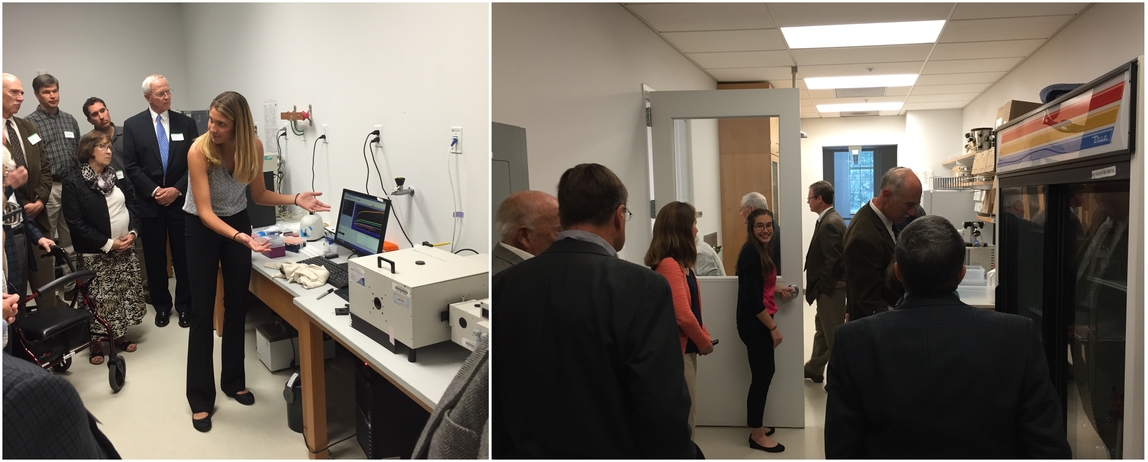
Rohit Pappu had a wonderful time attending and presenting at the NGP-NET conference in Belgrade, Serbia. Rohit's talk, titled' Conformations and molecular functions encoded by sequence patterns of non-globular proteins' examined a range of themes from the lab's work on the sequence-to-function relationship. Many thanks to the organisers for a great meeting!
CIDER version 1.6 is released! This marks the official full-release of CIDER (i.e. no longer in beta).
Rohit Pappu chaired one half of the outstanding ACS 'Instrinsically Disordered Proteins: Structure, Function, and Interactions' session organized by Nick Fawzi and Jeetain Mittal. Many thanks to Nick and Jeetain for organizing such a spectacular line up!
Jeong-Mo Choi, joins the Pappu lab as a postdoctoral fellow from Harvard University, where he was previously with Eugene Shakhnovich in the department of chemistry. Jeong-Mo will be exploring the aggregation and phase behaviour of low-complexity polar tracts. Welcome Jeong-Mo!
Rohit Pappu gave a talk entitled "Complexities of Huntingtin Aggregation and Phase Behavior" at the 30th Annual Symposium of the Protein Society in Baltimore, MD. Thanks to the Protein Society and organizers, particularly Brenda Schulman and Ralf Langen, for the invitation.
Rohit caught up with colleagues and friends at the Protein Society meeting. The highlight being dinner at The Helmand, Rohit's favorite restaurant from his postdoctoral days at Hopkins, with good friends Clifford Brangwynne, Sua Myong, and Yuh Min Chook. Good food, great company - wiser and happier for the experience!
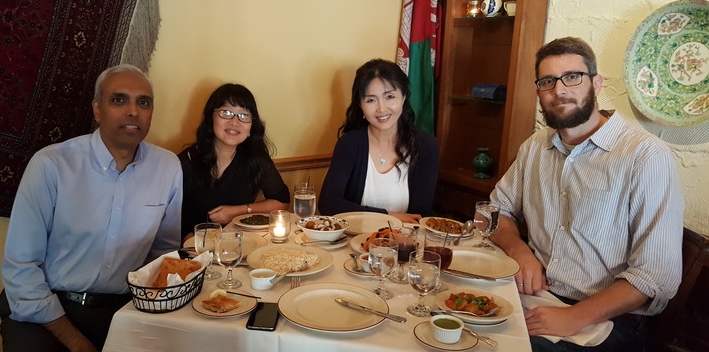
The verdict from members of the Pappu lab (Alex, Ammon, Kiersten, Megan, Rohit, and Tyler) is in: Switzerland is "officially" the most beautiful country we've visited. We will miss this gorgeous country as we return to our desks and benches in St. Louis.

Kiersten Ruff, Ammon Posey, Megan Cohan, Tyler Harmon, and Rohit Pappu spent all day Friday, July 01, 2016 at the EPFL in the lab of Dr. Hilal Lashuel discussing common interests in huntingtin and collaborative work on matters related to huntingtin structure, aggregation landscapes, and cellular functions. Thanks to Dr. Lashuel and all members of the Lashuel lab for their kind hospitality and incredible insights. We learned a lot and are excited about the prospects for this collaboration!!
Kiersten Ruff won an award for best poster presented by a graduate student on Monday, June 27, 2016 at the fourth Gordon Research Conference (GRC) on Intrinsically Disordered Proteins in Les Diabrelets, Switzerland. Congratulations Kiersten!!!
Megan Cohan and Alex Holehouse received travel awards sponsored by the US National Institutes of Health and the US National Science Foundation to attend and present at the Intrinsically Disordered Proteins Gordon Research Conference / Gordon Research Seminar in Les Diabrelets, Switzerland. Thanks to Dr. Richard Kriwacki and Dr. Monika Fuxreieter for this honor and their support!
Alex Holehouse was elected to chair the third Gordon Research Seminar (GRS) on Intrinsically Disordered Proteins in 2018. Alex will be joined by Shani Elbaum-Garfinkle from the Brangwynne lab as the co-chair of the meeting. Congratulations Alex and Shani!!!
Alex Holehouse gave an invited talk at the second Gordon Research Seminar (GRS) on Intrinsically Disordered Proteins on June 25, 2016 in Les Diabrelets, Switzerland.
We caught up with Pappu lab graduate student Megan Cohan who is spending her summer in Berlin learning the art of crystallography. We can't wait to welcome her back to the lab and get cracking with her work on FtsZ and phase separation of polyampholytic sequences.
Megan Cohan, Tyler Harmon, Alex Holehouse, Ammon Posey, and Kiersten Ruff attended and participated in the fourth Gordon Research Conference (GRC) on Intrinsically Disordered Proteins in Les Diabrelets, Switzerland. They took in some incredibly exciting talks, learned a ton from their interactions with kindred spirits, presented excellent posters regarding their work, and enjoyed the incredibly beautiful settings in Switzerland. Members of the Pappu lab were joined by Rohit Pappu who chaired a session and led discussions on Membraneless Organelles.
Tyler Harmon spent a few days in Prof. Jane Clarke's lab at the University of Cambridge working closely with Sarah Shammas and Michael Crabtree on the problem of coupled folding & binding of PUMA to Mcl-1. Tyler attempted to do some experiments (see attached picture), although it was decided that he should confine himself to theory & simulation. His ideas, crafted in collaboration with Sarah and Michael, are yielding important insights regarding the determinants of binding specificity in IDPs. Well done Tyler!!!
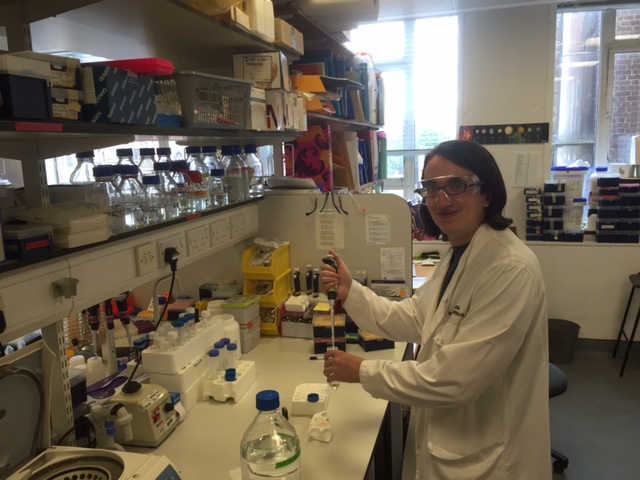
Rohit Pappu gave an invited talk at the MRC's Laboratory of Molecular Biology in Cambridge. This lecture was delivered in the new LMB building in the Max Perutz Lecture Theater - an incredibly humbling setting. Thanks to Dr. Madan Babu Mohan (MBM) for hosting Alex, Tyler, and Rohit and for the invitation to speak. It was wonderful to interact with colleagues at the LMB and learn from members of MBM the lab.
Alex Holehouse, Tyler Harmon, and Rohit Pappu spent a few days in Cambridge working with members of the Knowles, Clarke, and Babu labs. Thanks to Tuomas Knowles, Jane Clarke, and Madan Babu for their kind hospitality and incredible scientific insights!
Tyler Harmon's collaborative work on the spatial organization of the liquid-like nucleolus and its implications for translational regulation was featured in local news.
We welcome Jared Lalmansingh, a first year Physics graduate student, as a new full time member of the Pappu lab. Welcome Jared!
Alex Holehouse has been named the 2016 - 2017 Bonnie and Kent Lattig CBSE Graduate Scholar. Tyler Harmon has also been named as a recipient of the 2016 - 2017 CBSE Graduate Scholar award. Congratulations to Alex and Tyler!!!
Two recent papers from the lab were highlighted in this month's New & Notable issue of the IDP State Letter - a Biophysical Society sponsored newsletter set up by graduate students and postdocs in the IDP field.
Work published in PNAS on the protein p27 by Rahul Das, a former post doc in the lab, was featured on the Washington University School of Engineering home page.
Graduate student Tyler Harmon and Rohit Pappu collaborated with Marina Feric and Nilesh Vaidya from the Brangwynne lab to develop a sequence-inspired coarse-grain model that explains experimental observations regarding spatial organization in the nucleolus being the result of phase separation and the formation of coexisting liquid phases. The work was published in Cell (access article). The work was featured in a press release from the Princeton University School of Engineering. Also, Stephen Michnick and his colleagues wrote about this work and provided their perspective on the field of phase separation in Cell Biology (access article). Many thanks to Cliff Brangwynne for this exciting collaboration.
The Pappu lab was recently in the local Washington University news with announcements regarding grants awarded to the lab for work related Huntington's disease. For more information see the press release here.
Megan Cohan has passed her Biomedical Engineering qualifying examination with great aplomb. Congratulations Megan!!!
Rohit Pappu returned from Barbados where he attended and spoke at the conference on Physical Basis of Cellular Adaptation and Memory at the Bellairs Research Institute. Thanks to Jackie Vogel, Simon Alberti, and Mathieu Blanchette for organizing a stimulating conference in a wonderful setting. The world of intracellular phase transitions becomes more exciting each day.
BME graduate student Megan Cohan officially joins the Pappu lab! Welcome Megan!
A paper by Rahul Das, former postdoc in the Pappu lab, working in collaboration with members of the Kriwacki lab was recently accepted for publication in PNAS. This work demonstrates the use of Rahul's charge patterning ideas to uncover cryptic sequence features that regulate the phosphorylation of T187 in the cell cycle inhibitor protein p27.
Rohit Pappu gave a talk in the Department of Materials Science at Johns Hopkins University. Thanks to Martin Ulmschneider and colleagues at Hopkins for a wonderful visit.
Rohit Pappu was inducted into the AIMBE college of fellows in Washington DC on April 04, 2016
Rohit Pappu visited the CHDI offices in New York City to participate and speak in a workshop focused on the lifecycle of Huntingtin. This was a highly stimulating event and encouraging advances appear to be forthcoming in the field of Huntington's disease.
Alex Holehouse and Tyler Harmon gave platform talks at the 60th annual meeting of the Biophysical Society in Los Angeles, CA. Megan Cohan, Ammon Posey, and Kiersten Ruff, presented posters in different sessions at the meeting, and Rohit Pappu gave a symposium talk on the lab's work focused on sequence patterning effects on IDPs. All in all, a good showing in Los Angeles by the Pappu lab!
Anu Mittal, former postdoc in the Pappu lab, has accepted a position as a Bioinformatics Scientist at Affymetrix in San Francisco. Congratulations Anu!!!
The American Institute for Medical and Biological Engineering (AIMBE) has announced the pending induction of Rohit V. Pappu, Ph.D., Edwin H. Murty Professor of Engineering, Biomedical Engineering, Washington University in St. Louis, to its College of Fellows. Dr. Pappu was nominated, reviewed, and elected by peers and members of the College of Fellows for outstanding contributions to protein engineering and design and the molecular basis of neurodegeneration through advances in computational biology. A formal induction ceremony will be held during AIMBE’s 25th Annual Meeting at the National Academy of Sciences Great Hall in Washington, DC on April 4, 2016.
Rohit Pappu gave an invited talk at the 4th annual International Symposium of the Mathematics on Chromatin Live Dynamics in Hiroshima, Japan. Many thanks to the organizers and all the speakers for a fascinating meeting!
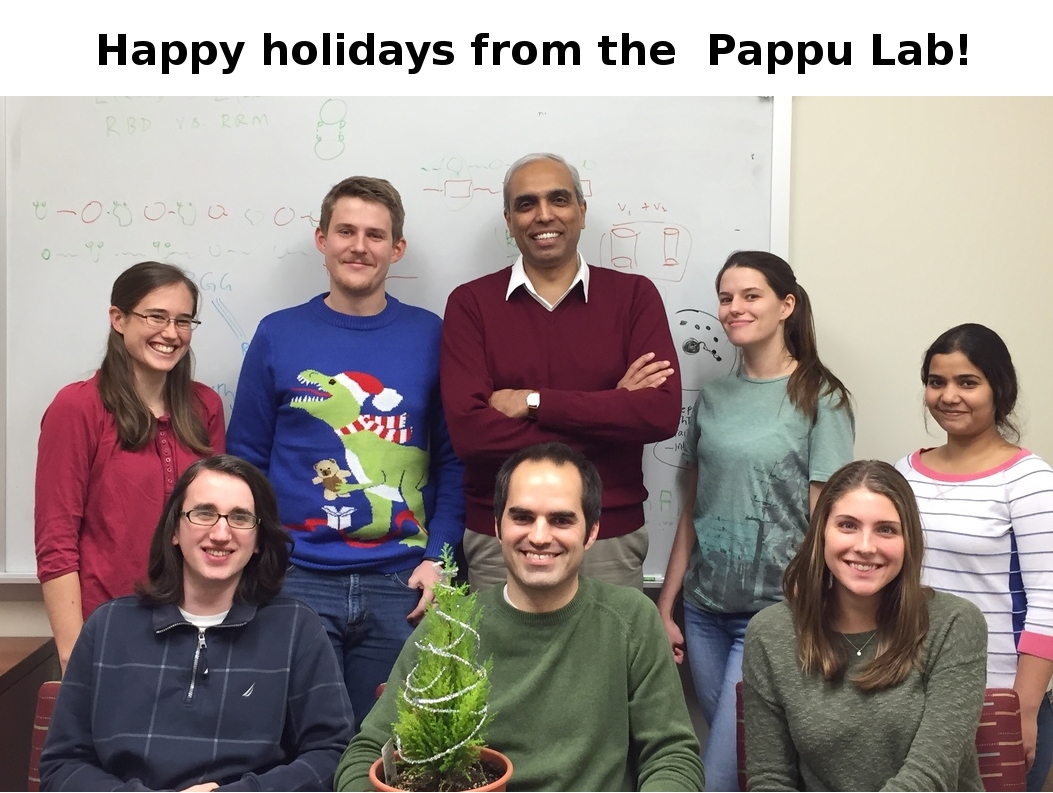
The Human Dark Proteome Initiative issued a call to action on Monday, November 09, 2015. Rohit Pappu is a member of the executive committee for this initiative, which is designed to increase awareness of and find ways to fuel research into the dark proteome - which is the part of the proteome that is not readily characterized using standard tools of structural biology. For more details see http://darkproteome.org.
Rohit Pappu gave an invited talk at the Southeast Regional Meeting of the American Chemical Society in Memphis, TN. All thanks to Richard Kriwacki and Arielle Follis for organizing a wonderful session on IDPs.
Alex Holehouse and Rohit Pappu published a News & Views segment entitled Encoding Phase Transitions in Nature Materials discussing the recent paper published in Nature Materials by the Chilkoti group. Authors García Quiroz and Chilkoti succeeded in extracting sequence-encoded heuristics to guide the design of thermoresponsive intrinsically disordered protein based polymers.
Rohit Pappu gave the opening plenary talk at the 12th annual New England Structure Symposium at the University of Connecticut in Storrs, CT. The title of his talk was Sequence-conformation-function relationships of intrinsically disordered proteins.
Rajni Verma, joined the Pappu lab as a postdoc from Witchita State University, where she was previously with Katie Mitchell-Koch in the department of chemistry. Rajni will be using a range of computational approaches to examine questions relating to IDPs and protein aggregation. Welcome Rajni!
Rohit Pappu gave the keynote lecture at the 29th Gibbs Conference on Biothermodynamics in Carbondale, IL. His talk, "The complex lives of simple sequences", explored the lab's work on the determinants of IDP behaviour in the context of a number of new and unpublished systems. Lab members Tyler Harmon, Alex Holehouse, Ammon Posey and Kiersten Ruff all presented work at the conference.
Rahul Das, postdoc and research scientist in the Pappu lab between 2009 and 2015, left the lab to join The Rothberg Institute as Bioinformatics Scientist and Senior Research Fellow at Yale University. Congratulations Rahul!!!
Rohit Pappu was quoted in a news segment published by Science News featuring work published by the Chilkoti group in Nature Materials (Access Article).
Rohit Pappu gave a talk about cis and trans modulation of polyglutamine aggregation and phase separation at the fifth CDMC symposium at the University of Montreal. All thanks to Steve Michnick and his group for their wonderful hospitality and stimulating discussions.
Rohit Pappu gave a talk about the Phase Behavior of IDPs at the CECAM workshop on IDPs in Zurich, Switzerland. The logo for this workshop was derived from the diagram of states for IDPs developed by Pappu lab research scientist Rahul Das.
Rohit Pappu gave a general-public talk as part of the Telluride Science Research Center Town Talks. His talk, entitled 'Neurodegeneration from the ground up' focussed on the lab's work around age-related neurodegenerative diseases.
Rohit Pappu participated in and gave a talk at the Telluride Science Research Center Workshop on Intrinsically Disordered Proteins.
The Pappu lab was featured in the School of Engineering and Applied Sciences biannual newsletter. For a short video describing the lab's work, please see here.
Rohit Pappu gave a talk at the 2015 FASEB summer research conference on the Molecular Mechanisms and Physiological Consequences of Protein Aggregation. Kiersten Ruff, Pappu lab graduate student, and Ammon Posey, Pappu lab postdoc also participated in and presented posters at the FASEB conference in West Palm Beach, FL.
Rohit Pappu was elected to chair the 2017 FASEB summer research conference on Protein Aggregation. The location and dates for this conference are to be determined.
Rohit Pappu gave a talk about the lab's work on IDPs at the 2015 Proteins Gordon Research Conference in Holderness, NH.
Tyler Harmon, a graduate student in the Pappu Lab, was invited to speak at the 2015 Protein Folding Consortium (PFC) meeting in Berkeley, CA. Tyler spoke about his work on using machine learning approaches combined with molecular simulations to design specific structural propensities for proteins. In addition, Alex Holehouse, a graduate student in the Pappu Lab, was one of the meeting's organizers.
Kiersten Ruff, a graduate student in the Pappu Lab, was named the 2015-2016 Lattig Fellow. Congratulations Kiersten!!!
Kiersten Ruff, a graduate student in the Pappu Lab, was invited to speak at the Intracellular Phase Transitions meeting in Princeton, New Jersey. Kiersten spoke about her work on developing coarse grained models for exploring polyglutamine aggregation. Rohit Pappu also gave a an invited talk about the phase behavior of polyglutamine containing molecules. Alex Holehouse and Tyler Harmon, graduate students in the Pappu lab, attended and presented posters at the Princeton workshop.
Rohit Pappu gave a talk at the University of British Columbia in Vancouver. Thanks to Joerg Gsponer for hosting.
Rohit Pappu gave a talk at Duke University's NSF MRSEC. Thanks to Ashutosh Chilkoti for the kind hospitality and stimulating discussions.
Rohit Pappu was installed as the Edwin H. Murty endowed Professor of Engineering and Washington University in St. Louis. For more information click here. A video of the installation ceremony and Rohit's talk can be found here.

Kiersten Ruff, a graduate student in the Pappu Lab, was invited to speak at the 59th Biophysical Society meeting in Baltimore, MD.
Alex Holehouse, a graduate student in the Pappu Lab, was one of the winners of the SRAA student poster competition at the 59th annual meeting of the Biophysical Society meeting in Baltimore, MD. The award was given to Alex in the Intrinsically Disordered Proteins category.
Rohit Pappu co-chaired the ninth annual symposium of the IDP subgroup as part of the 59th annual meeting of the Biophysical Society meeting in Baltimore, MD.
Work by Kiersten Ruff and Siddique Khan on their coarse-grained model for polyglutamine aggregation was highlighted on the Biophysical Journal website.
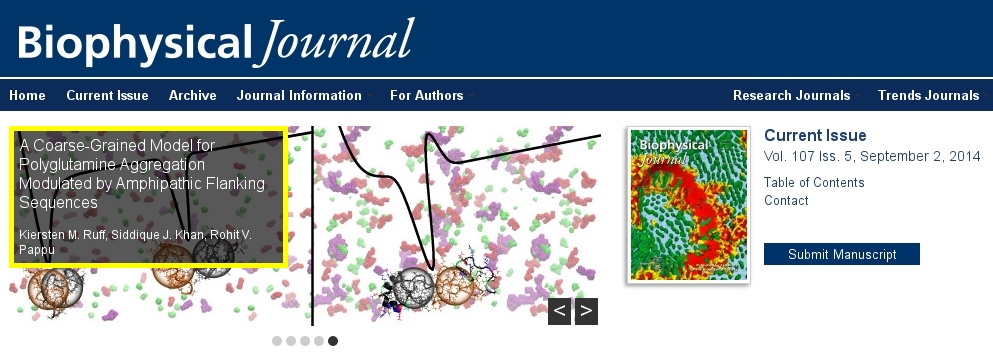
Alex Holehouse, a graduate student in the Pappu Lab, was invited to speak at the 28th Annual Gibbs Conference on Biothermodynamics in Carbondale, IL.
Anu Mittal a post doc in the lab, has contributed towards a groundbreaking new study in the fight against the Ebola virus. For more information, please see the press release or read the story on the NPR blog.
Kiersten Ruff was invited to speak at the recent Graduate Research Symposium (GRS) preceding the Gordon Research Conference (GRC) on Intrinsically Disordered Proteins, Stonehill College, MA, July 05, 2014.
Rohit Pappu delivered the opening keynote lecture at the recent Gordon Research Conference on Intrinsically Disordered Proteins, Stonehill College, MA, July 06-11, 2014.
Ammon Posey joined the Pappu lab as a postdoc from Johns Hopkins University. Ammon will be using a range of in vitro biophysics approaches to examine mechanisms of polyglutamine aggregation and explore the conformations of disordered proteins. Welcome Ammon!
CIDER [Classification of Intrinsically Disordered Ensemble Regions], the lab's new webserver for the calculation of various IDP parameters, is nearly complete and closed beta signup is now available. Please click here for more information.
Kiersten Ruff was named a CBSE student scholar for the period between July 01, 2014 and June 30, 2015 by the Center for Biological Systems Engineering. This award provides partial support for Kiersten's thesis work in the Pappu lab.
Lauren Bedell joined the Pappu lab for the summer of 2014. Her work on the conformational properties of neurofilament sidearms is being supported by an REU supplement award from the National Science Foundation.
Pappu lab members, Tyler Harmon, Alex Holehouse, Anu Mittal, and Kiersten Ruff along with then rotation student Ian Harvey participated and contributed to the CBSE sponsored INSPIRE pilot program for St. Louis area middle school students.
Alex Holehouse, a graduate student in the Pappu lab, spoke at the 2014 Protein Folding Consortium (PFC) meeting in Ann Arbor, MI
The Center for High Performance Computing (CHPC) has recieved a new BRS shared instrument NIH award, submitted by Rohit Pappu and Fred Prior , for the development of CHPC Cluster 2.0. This will see the supercomputing facilities expanded and enhanced to meet the growing needs of Washington University in St. Louis' supercomputing demands.
Albert Mao, a final year MSTP student who did his graduate work in the Pappu lab, matched for residency with a preliminary internal medicine year at the University of Illinois, Chicago, followed by anesthesiology at Massachusetts General Hospital. Huge congratulations to Albert!
Rohit Pappu gave one of keynote lectures at the IDP Subgroup meeting at the 58th annual Biophysical Society Meeting, and was elected one of the co-chairs for next year's IDP Subgroup Symposium along with Ed Lemke.
Anu Mittal, a current postdoc in the Pappu lab, was selected to give a talk in the IDP Platform at the 58th annual Biophysical Society Meeting.
Kiersten Ruff and Alex Holehouse, graduate students in the Pappu lab, were two of the winners of the SRAA student poster competition (Kiersten for the second consecutive year!) at the 58th annual meeting of the Biophysical Society meeting in San Francisco, CA. The award was given to them in the Intrinsically Disordered Proteins category.
Alex Holehouse, a graduate student in the Pappu lab, was selected as the graduate student representative for the IDP subgroup of the Biophysical Society
CAMPARI v2.0 was released in early February, and is available for download from here. All credit for this update goes to Andreas Vitalis at UZH
Albert Mao, a final year MSTP student who did his graduate work in the Pappu lab, has been selected as a Spencer T. and Ann W. Olin Fellow. Olin Fellows are “recognized for past achievement and the promise of a distinguished career in the biomedical sciences". Congratulations Albert!!!
Dr. Alan Chen, alumnus of the lab, has been appointed assistant professor at the RNA Institute and department of Chemistry at SUNY Albany. Dr. Chen will be working on the use of physics-based simulations of RNA as a tool for studying RNA folding and biomolecular engineering. For more information click here.
The lab's most recent publication (Denatured State Ensembles with the Same Radius of Gyration Can Form Significantly Different Long-Range Contacts) has been selected to be highlighted on the journal's home page . This will be displayed after the paper's print publication date.
An article about the lab's work on the Huntingtin protein was featured on AAAS EurekaAlert!
Rohit Pappu was named a fellow of the American Association for the Advancement of Science (AAAS) in honour of his continuing work in the field of intrinsically disordered proteins. More information from the WUSTL press release can be found here.
Dr. Rahul Das, a postdoc in the Pappu lab, recently had an article published in the September issue of the biophysical society newsletter titled Evolution of IDP field.
The new Pappu Lab website has been developed and deployed, running on the recently released Bootstrap V3.0
Dr. Scott Crick, alumnus of the lab, received a three year NRSA postdoctoral fellowship award from the NIH. Scott will be remaining at Washington University, and will be working on the modulation of amyloid-beta aggregation in the endosomal/lysosomal pathway.
Nick Lyle, PhD student in the Pappu lab, successfully defended his PhD thesis on May 3, 2013. Congratulations Nick!!!
Dr. Rahul Das, a postdoc in the Pappu lab, was selected as the postdoctoral representative for the IDP subgroup of the Biophysical Society
Rohit Pappu has been invited to join Faculty of 1000. For details of the lab's reviews, see our F1000 page
Kiersten Ruff, a Computational and Systems Biology graduate student in the Pappu lab, was one of the winners of the SRAA student poster competition at the 57th annual meeting of the Biophysical Society meeting in Philadelphia, PA. The award was given to Kiersten in the Intrinsically Disordered Proteins category.
An interview with Rohit Pappu on the topic of Intrinsically Disordered Proteins was featured on AAAS EurekAlert!
Albert Mao, MD/PhD student in the Pappu lab, successfully defended his PhD thesis on August 23, 2012. Congratulations Albert!!!
Nicholas Lyle , graduate student in the Pappu lab received a poster award for his work presented at the second Intrinsically Disordered Proteins Gordon Research Conference held in Mt. Snow, VT, July 08-13, 2012.
A recent feature on the lab's work and the creation of the new Center for Biological Systems Engineering was published in the Washington Magazine.
Dr. Scott Crick, postdoc in the Pappu lab, was selected to give a talk at the 56th Annual Meeting of the Biophysical Society in San Diego, CA, February 2012.
Albert Mao, MD/PhD student in the Pappu lab, received a cash prize of $100 and a citation from the Biophysical Society as one of the winners of the SRAA student poster competition at the 55th annual Biophysical Society meeting in Baltimore, MD. The award was given to Albert in the Intrinsically Disordered Proteins category.
Dr. Rahul Das, a current postdoc in the Pappu lab, was selected for the postdoc award and spoke at the 5th annual symposium of the Intrinsically Disordered Proteins subgroup meeting prior to the 55th annual meeting of the Biophysical Society's annual meeting in Baltimore, MD. Rahul spoke about his recent findings on bZIP transcription factors. In addition to the speaking opportunity, Rahul received a cash prize of $500.
In December we officially released our CAMPARI modeling package as open source software under the GNU General Public License (GPL) (v3). The package is free to all users and the source code is disseminated in its entirety. Our goal is to facilitate, independent assessments of our solvation model, forcefield paradigm, and sampling tools. Detailed documentation may be found at http://pappulab.wustl.edu/campari. For users of CAMPARI, we have set up a help desk so queries and questions can be sent via Email to campari.software@gmail.com
Dr. Andreas Vitalis, alumnus of the lab received the 2010 Empiris Award for Research in Brain Diseases. This award was given for his thesis work entitled "Probing the early stages of polyglutamine aggregation with computational methods". As part of this award Andreas received a citation and CHF5000.
Dr. Alan Chen, alumnus of the lab, received an NRSA postdoctoral fellowship award from the NIH. Alan is pursuing his postdoctoral work in Dr. Angel Garcia's lab at Rensselaer Polytechnic Institute and he is working on RNA molecules involved in viral entry pathways.
Albert Mao gave an invited talk at the first Gordon Research Conference on Intrinsically Disordered Proteins. This GRC was held in Davidson College in North Carolina in the summer of 2010.
Dr. Matthew Wyczalkowski, alumnus of the lab, received an NRSA postdoctoral fellowship award from the NIH. Matt is pursuing his postdoctoral work in Dr. Larry Taber's lab at Washington University and he is working on multi scale models of morphogenesis.
Scott Crick gave a talk at the 2010 meeting of the Biophysical Society discussing results from his measurements of polyglutamine aggregation.